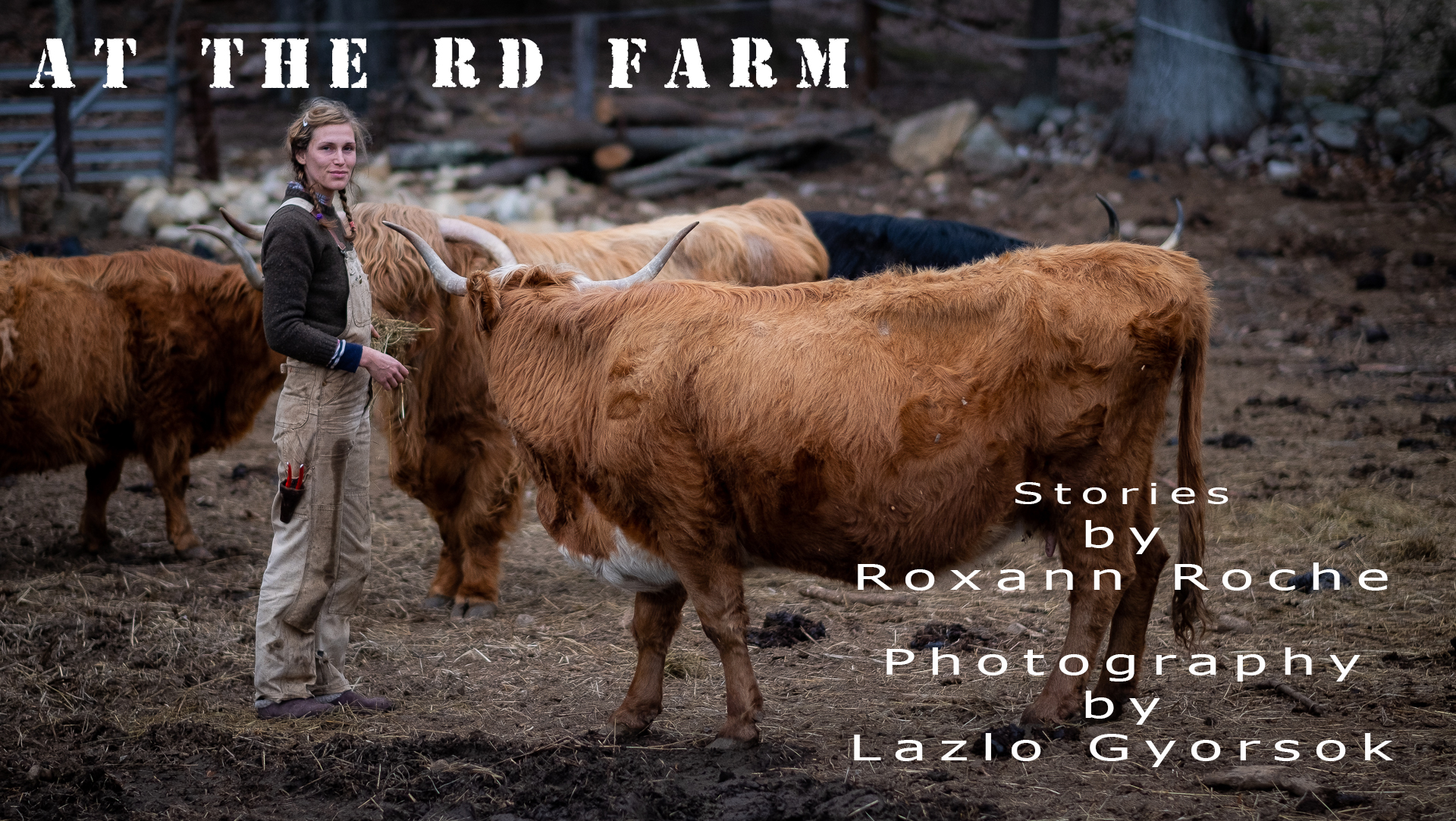
I’ve been asked to write "a few words” about a
book that speaks clearly and simply for itself.
Even readers who have never visited a farm will
feel at home in the barns, pens, pastures and
among their inhabitants. They have been so tellingly
captured in the photos of Lazlo Gyorsok and the
words of Roxann Roche that the characters quickly
feel like old friends. Newcomers to the farm may even
wish to stay, and all may find lessons and truths
in farm governance.
~ Emery Roth II ~

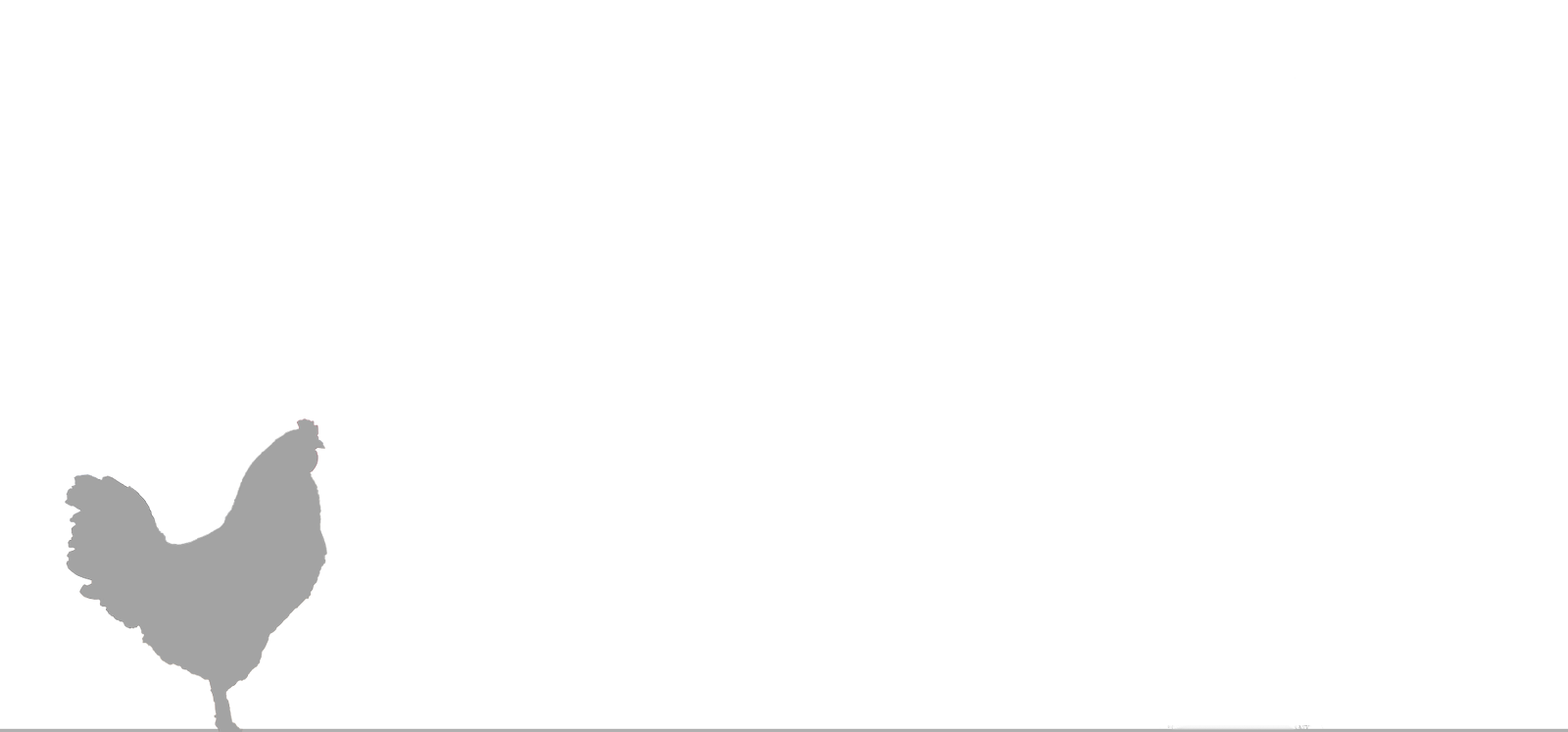
People always ask me, "is your donkey friendly?".
My first thought is to answer,
"depends on how much work you've done on your soul...";
instead I say, "depends".
He has a tendency to rip apart any vessel which contains grain.
Several times I've gone into the barn to do chores,
only to find him knuckle deep in spilled grain,
munching away, peering at me, ornery as a white faced hornet.
You see, he's not allowed grain, in ANY form.
It reacts badly with his already slightly peevish personality
and makes him spiteful and calculating.
But on Donkey's good side... he is the most intelligent and
observant creature imaginable if you are able to meet him on his level.
Once he decides on the fitness of your character
he does not waver and never again questions his loyalty to you.
His priorities are steadfast to protect his courtyard. By
proximity to his kingdom,
small pigs, growing chickens, grazing turkeys
are safe from the ever-present wildlife population.

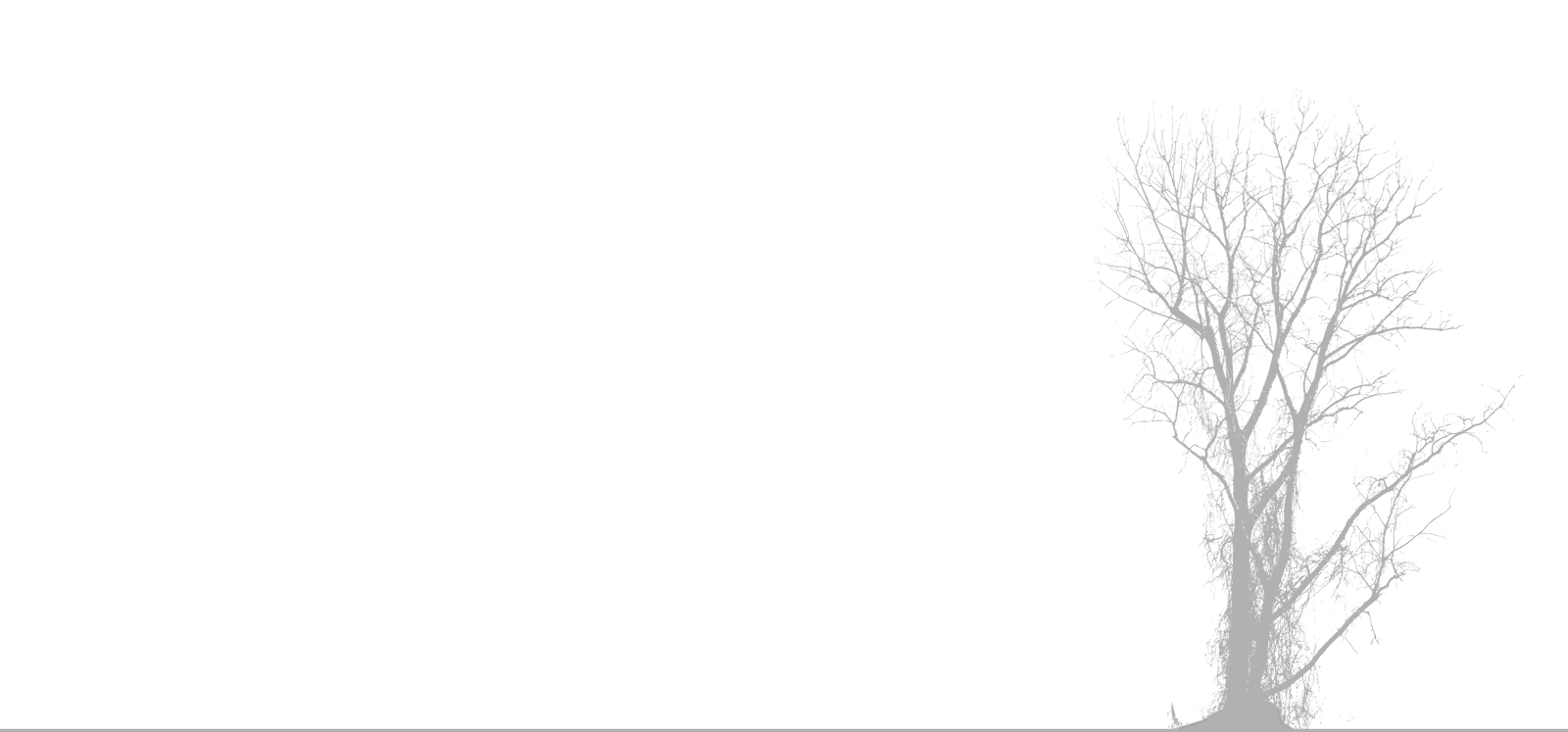
Relatively benign personality, beautiful black fur.
I can tell Chicken apart from her sister only when I face her head on and
she looks at me. Chicken's face is less feminine, and her eyes decidedly
less intelligent than her sister who is the leader of the herd.
But Chicken, who didn't breed the first year we had her
for reasons unknown, saved herself from being "next in line
to meet the baby Jesus", because of her beauty.
Black Highlanders are truly a sight to behold, shiny wavy black coat
with wooly ears and rugged faces.
To know the Highlander breed is to love them.
A consistent and logical hierarchy exists amongst the cows,
where intelligence and calm authority
wins out over aggression and blowharded-ness.
We could take a lesson from these animals on the way
we present ourselves to our fellow man.

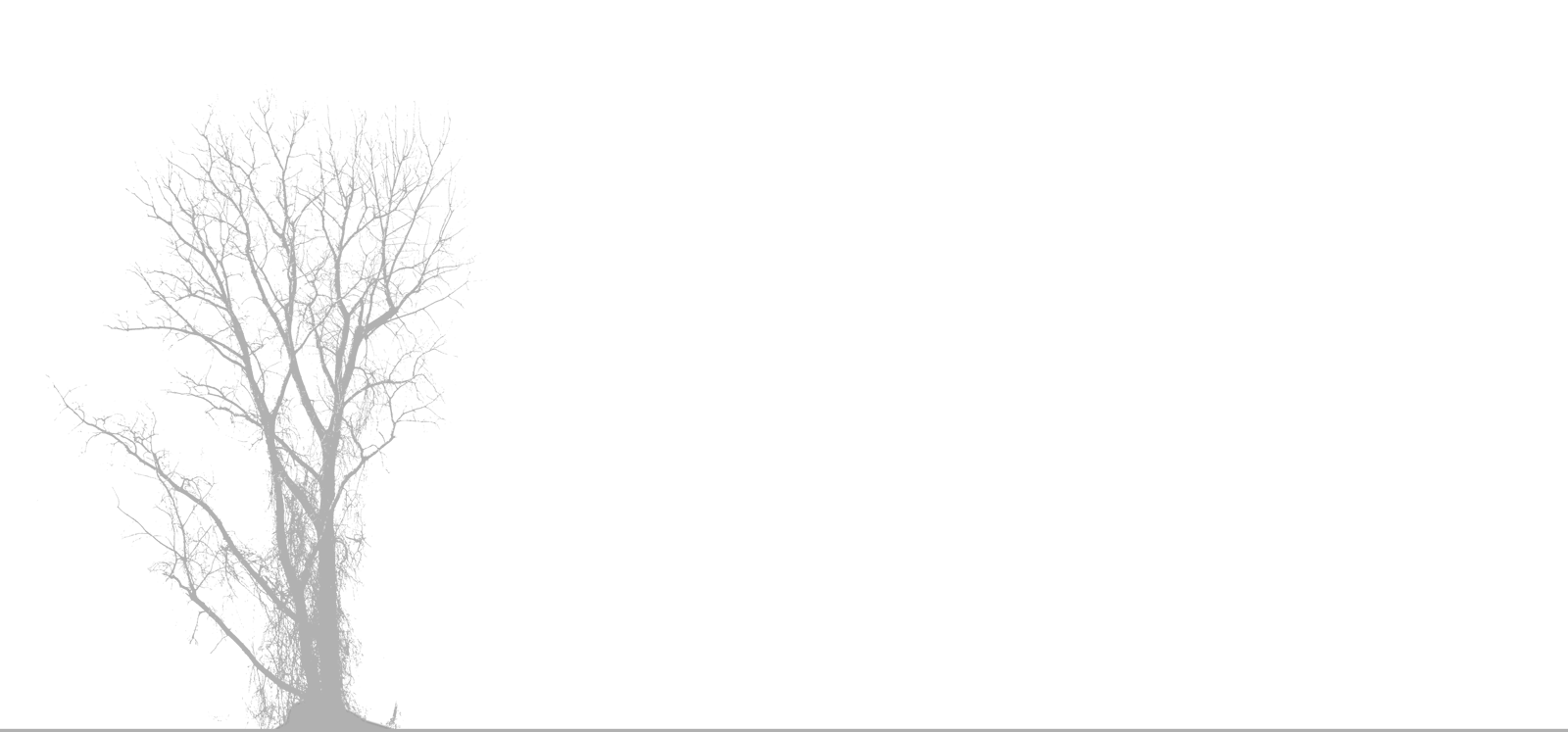
We sometimes find ourselves facing the world with a handicap or two.
Perhaps we were born to parents who shouldn't have been parents
or maybe we saw war and could never see the world as good again.
We might have one leg shorter than the other or a really
unfortunate name,but life keeps on, with or without us. We
soon learn, if we want to be a part of this beautiful,
flawed universe, we must adjust.
Before we got her, Luna had lost sight in one eye from infection.
When she was a wee one her tail got closed in a door, and the puffy
bottom part fell off. She lost her first calf.
We could learn a lot from cows if we just paid attention.
They just keep going.
The paths worn in the forest where they live this time of year
show deep commitment to routine.
Every morning the cows line up to travel in a group to the
pond to drink where they congregate for the first light of the day.
They sun themselves until the heat becomes too much.
Each one then finds a shady.grassy place to rest for the midday.
If one has a calf she hides him up on the hill in a
mossy clearing under a spreading tree until
the heat of the day is gone.
The herd travels back down the path single file for dinner.
There is a comfort in routine that heals most wounds.


Chicken, awakes from her nap in the shade of the old maple.
Slightly disturbed by the man with the camera but too
full of fresh grass to make a point of it.
Ruffled and rested she lumbers to a standing stance,
unsure of where her next move will take her,
but sure she will be moving from her mid-morning spot.
The herd acknowledges her decision to rise,
quietly chewing their morning grazings, aware but not
alarmed by their observer behind the lens.
He moves about, from still shot to still shot
piecing together the story of this moment.
And they watch him.
Donkey, ambassador of inquiry,makes his careful decision
and determines that this moment is good.


Late spring, on years when rain makes 1st cutting of hay
too late to be mowed, the dandelions go to seed.
It's said that pigs are the best way to get rid of this pesky weed.
They root around and pop the tap root clean out.
They love dandelion root,seeking it out over more
accessible above ground plants.I often wonder how the baby pigs,
weaned from their mothers before coming to the farm,
know about dandelion root when first let out on pasture.
No one had showed them and yet they go right to it
and pop it out like it was second nature.
How instinctual animals are! Cows always enter
new pasture by walking as far as they can to the
other side before they stop to eat.
I suppose they are taking stock of what's available before consuming.
This seems to be a survival instinct which has served them well.
Donkey on the other hand, has more loyalty to his human keepers,
grazing where he likes and then showing up at chore time for dry hay.
He does enjoy dinner company and
follows at a distance behind the herd.

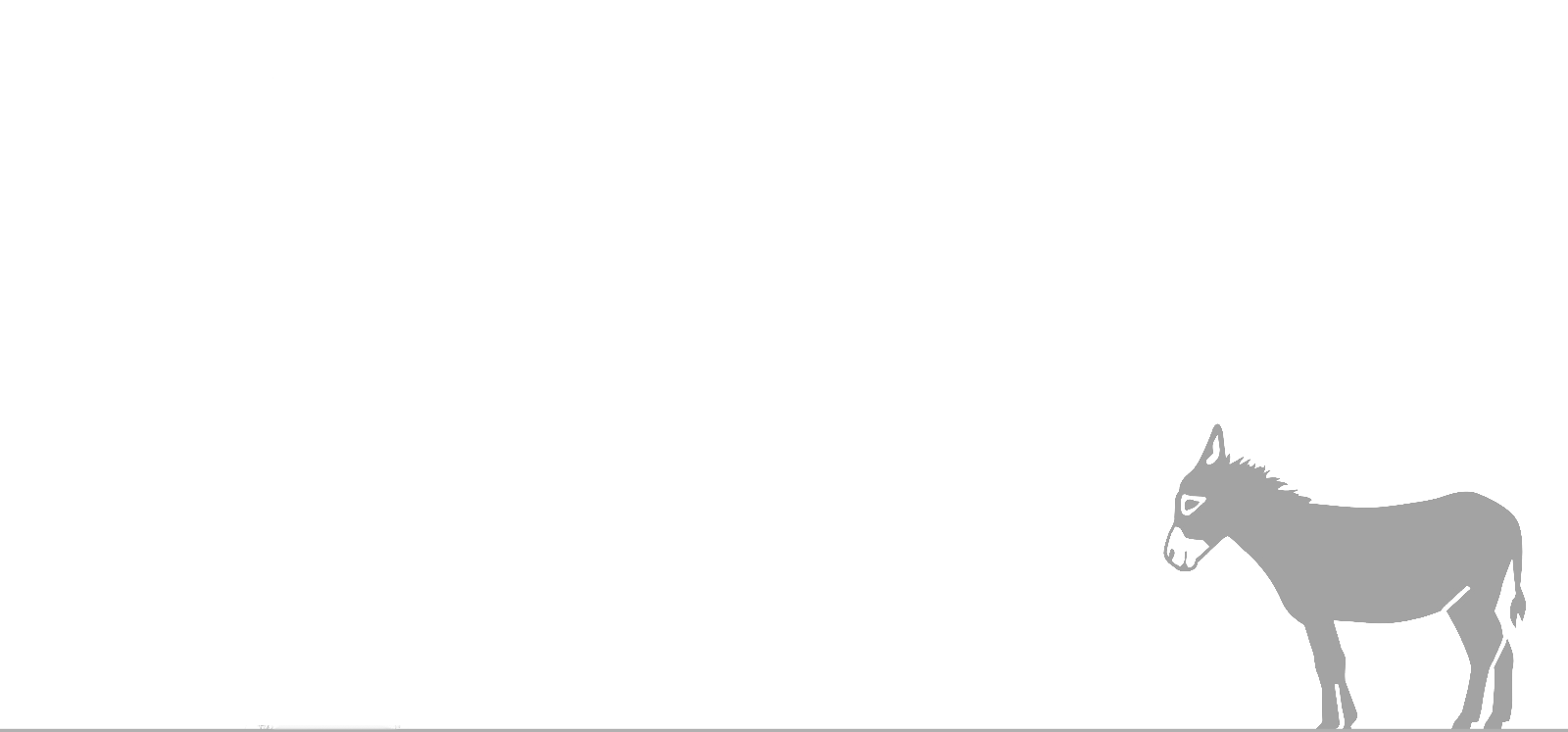
This particular door was built after the old door got torn off its hinges
on one of Donkey's bad days. One of those times
I walked in on him knuckle deep in layer pellets.
"Gawd damn it Donkey!"
He does what he likes, though. He responds poorly to argument or punishment.
One must outsmart him, calmly. He has no respect for a lost temper.
He used to follow me around during chore time to all the various pens.
In my hand would be metal buckets filled with the different
feeds for pigs and chickens and such. Invariably I would always need
to free up a hand to unplug electric, fill a water bowl etc.
I would set a bucket down and turn away for a split second, donkey
would be in that bucket. Oh how frustrated I would get!
He's smart, you see, very sneaky.
I had to think up something really clever, something that would keep him
from stealing the bucket, every time I did chores.
Donkey hates electric. I hate electric too, being shocked enough times myself.
My metal buckets are great conductors of electricity.
I placed my bucket on a Styrofoam throne and threaded a stray piece of electric
fencing through the handle just enough for contact.
Donkey looks at the bucket, and he looks at me, disgusted. I leave him the bucket.
Next time chore time came: I fill my metal buckets and invariably
I always have to free up a hand to fill a water bowl or move a fence, so I set
my bucket down. Donkey is glaring at me from his stall,
disgusted. We've never argued about the buckets again.

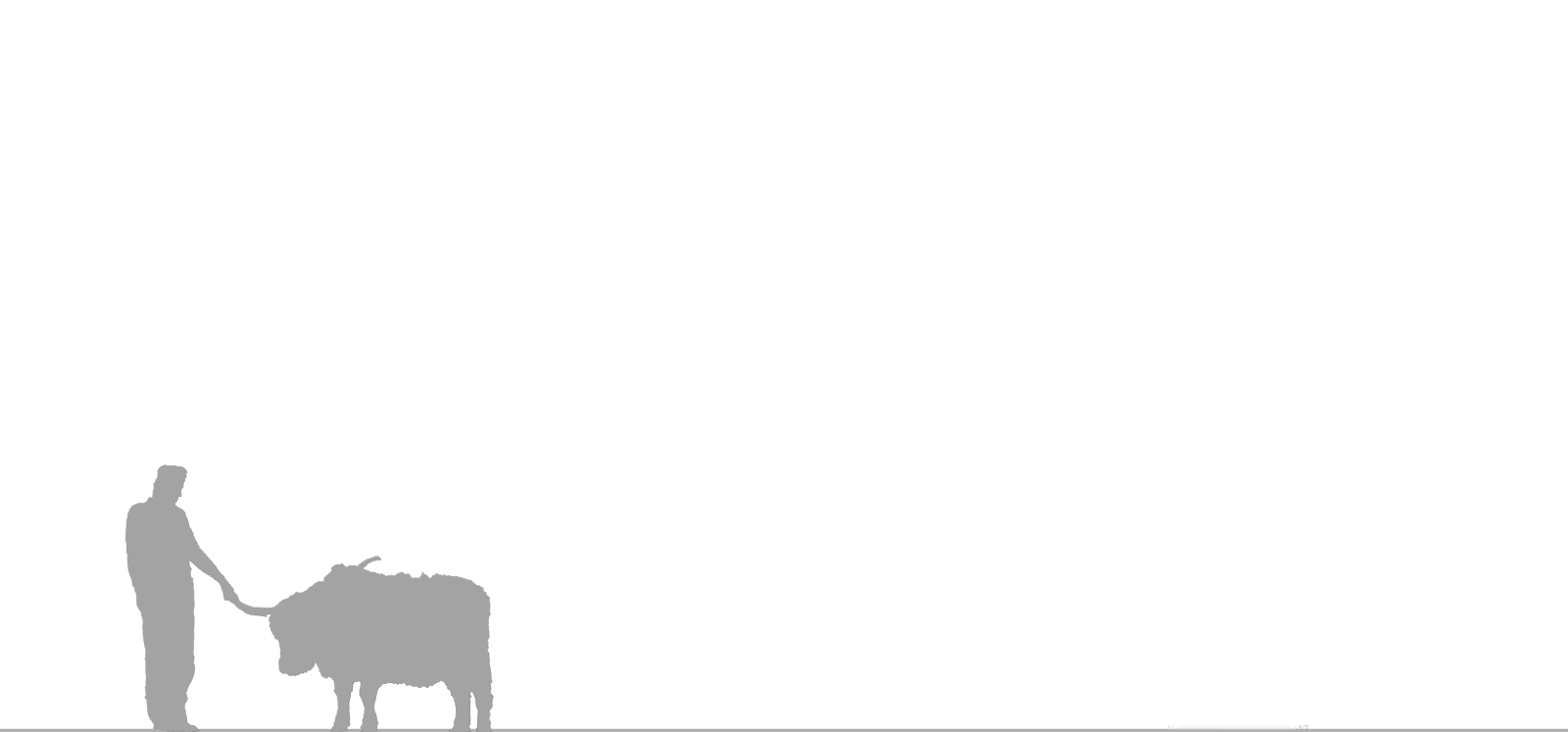
If I had known in the beginning that farming would demand every ounce of go I got,
I'd still would have said 2 years ago, "yeah, let's do it..."
My charge is the worry part, probably not the most effective
when it comes to getting stuff done, but still a necessary part to play.
Some details fall through the cracks when Daniel goes all out,
working, haying, fixing, feeding, thinking, doing. My real job,
after all the other jobs, my most important job is finding those missed details.
One detail: Maggot the bull calf who got flystrike last calf season and earned
his title Master Maggotician, from his unfortunate health scare and his
propensity to magically escape fences and gates.
Through him I discovered what my job really was.
My worry keeps me always on guard and that keeps missed details
from turning into casualties. At least that's what I tell myself.
In farming, sometimes there are just too many details.
Dish soap, the heifer calf, taught me that.


A silvery popple has made the truck its protector.
The tree grows up though the floorboards of the flatbed,
saved from sure chainsaw misfortune by its proximity to metal and frame.
Put there years ago by the last guardian, steward,
lover of this land. The tree roots it here on the banks of the Housatonic River.
What is it that roots a man to a piece of land?
That quality that binds him, year after year, season after season to one place.
The dedication to the essence of a place,
sometimes passed beyond lifetimes from one steward to the next.
What was it about this truck, that earned it a place here?
A last tangible portal to a world that is now all but gone?
Is there is a potentiality created in the daily driving and
working of a truck that earns it a divine place of rest?
There must be as such, because there it sits, year after year, season after season.
Its divinity catches the eye of observers walking past.

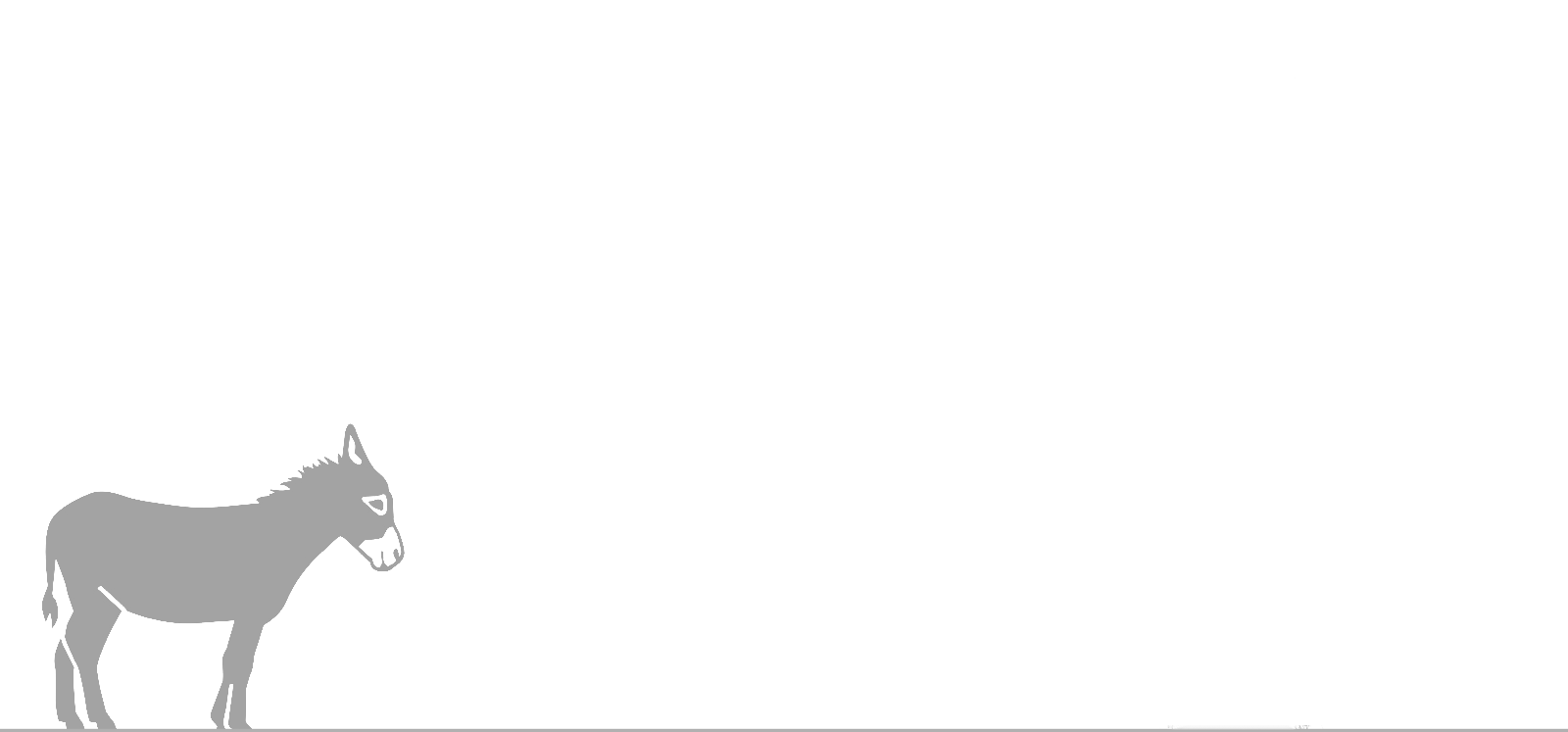
There are so many layers of human efforts on this land.
Fence posts, now lean in exhaustion from years of seasons - freezing
and thawing, floods and drought, day after
day the movement of the world slowly lower structures to the ground.
Stone walls, weathering gravity, jut from the forest floor,
as reminders of what this land really is
and what it should always be: worked and farmed.
How tragic to halt the destiny of any land and retire
her purpose or let her fields lay fallow.
If blood, tears and heart carves energy into a place and gives it life
- I mean really breathes life into its veins and roots and rocks
- then to stop the carving of her bones and let the wild reclaim
her would be to abandon something beautiful.
Those who find the incredible affirmation of life in farming
and building empires will understand the tragedy of doing nothing
while the movements of the world slowly erode the
monuments and sacrifices of people who came before.


Donkey is ever present in the happenings here.
If there is action he is observing or interacting.
A social creature with strong tendencies toward introversion, I can relate.
Too much confusion or too many visitors sours his mood quickly.
Small pigs and poultry seem to be most readily welcome,
people and cows a hearty second with sheep a distant maybe - often no.
It is unknown the origin of his aversion to sheep.
However, the slightly dim and flighty nature of them might offer a clue.
On days when social requirements become tiresome,
Donkey can be found in the distant back pasture near Beth's sheep field
deep in fantasy about terrorizing the woolly creatures beyond the fence.


It must have been a hot day when the old man parked the Studebaker
in the pig pen years ago. Backing it in straight and turning off
the key he let the old girl rest for a while.
Window rolled down, and side glass cocked to catch the August breeze he
clicks open the squeaky door one last time and closes it with a kaaa-chunk...
The years are hard on metal as they are on many things.
Places with old injuries: a scratch, a bump,
a broken fender see the harshness of time most clearly.
The object of time's relentless assault will weather and rust and rot
and fall back into the single elements from which it was created.
Eras are cyclical and can end abruptly with single events.
New eras pop up unexpectedly and often
are not discernible until part way through.
These epochs can be defined by objects and one is reminded of the
incredible impermanence we each embody, either reluctantly or acceptingly.
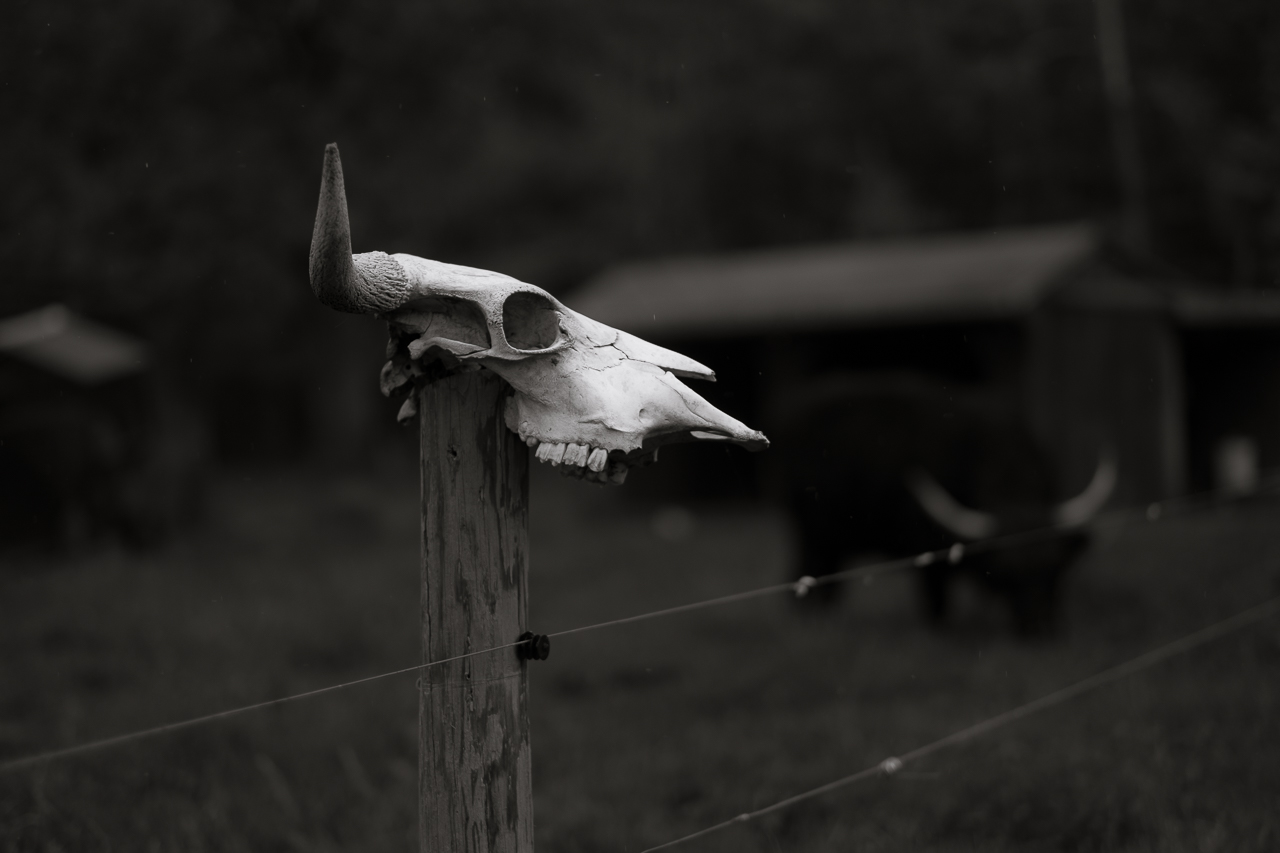

They carry their children by and walk along the edges of the fields,
only to look back and remember how close we all really are.
The skull is from Ferdinand. A brindle bull, mostly Highlander,
very stocky, quite small for a bull, possibly malnourished as a calf.
He is father to most of last year's calves, and two sets of twins among them!
His time on the farm was short. Although he was good natured and sweet,
he had a bad leg and that sealed his destiny.
A farm, looking from the outside, can seem like a heartless place to unfamiliar eyes.
Death walks alongside so many aspects of farm life.
It is swift and does not discriminate. However, death and life are not
so opposite and without one there would not be the other.
From death and decay come new life, clean dirt as we call it.
The health of the herd often requires tough decisions that take into account
many facets, from disease quarantine to economic viability and efficiency.
In this sustainability there is great beauty and without a rational mind,
farming would not work. Ferdinand stays on the post
to remind us of the tough truths in farming.


There have been a few Sorry Charlie's over the years,
earning their name by the nature of their destiny.
A future mostly determined by gender and genetics.
The culture of meat in our society is such a strange reality.
It's my philosophy that if my choice is to consume meat from the bodies of animals,
any denial of this fact would be the ultimate betrayal
and disrespect to the creature who I am consuming.
So many people balk at this visual, wringing their hands in guilt
at a choice that should be conscious - sometimes preferring blinders over truth.
I have pondered long on this subject as a shepherd of creatures and purveyor of meat,
and I find the most ethical way to approach this is to acknowledge,
without sugar coatings, the reality.
I gain solace from the fact that Sorry Charlie is loved and cared for.
I find comfort in the knowledge that he was never subjected to tent buildings
stuffed with 100s of animals and can spend sunny mornings enjoying the world
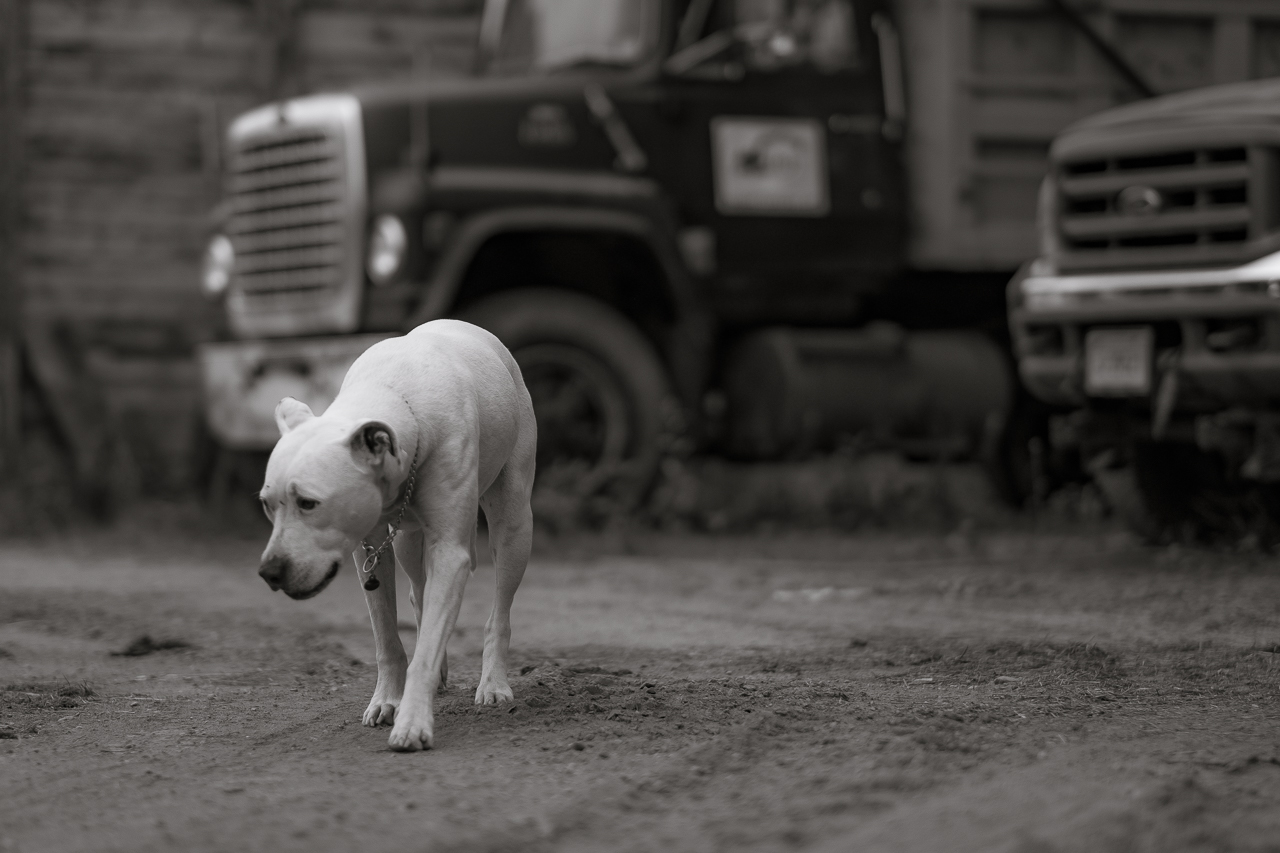

She’s gotten better about sticking around home and doesn’t get into trouble like
she used to before we settled down here (me either for that matter).
Bell, nothing-but-a-Waterbury-mutt, I call her with affection.
She’s come a long way from when I met her 7 years ago, on July 4th.
She’s still a hapless scrounge, and can't hear a lick. She is Liberty Bell,
a little cracked, not broken and as loyal as the day is long.
For a while we wondered from place to place.
We drove a lot, just to see what the world was like out there, just a deaf dog
and her girl.
Then we finally settled down on that proverbial long dirt road.
We call this little patch ours, where
big trucks and old tractors line the way like sentries.
There’s nothing more soothing to a wayward soul than a little bit of home.
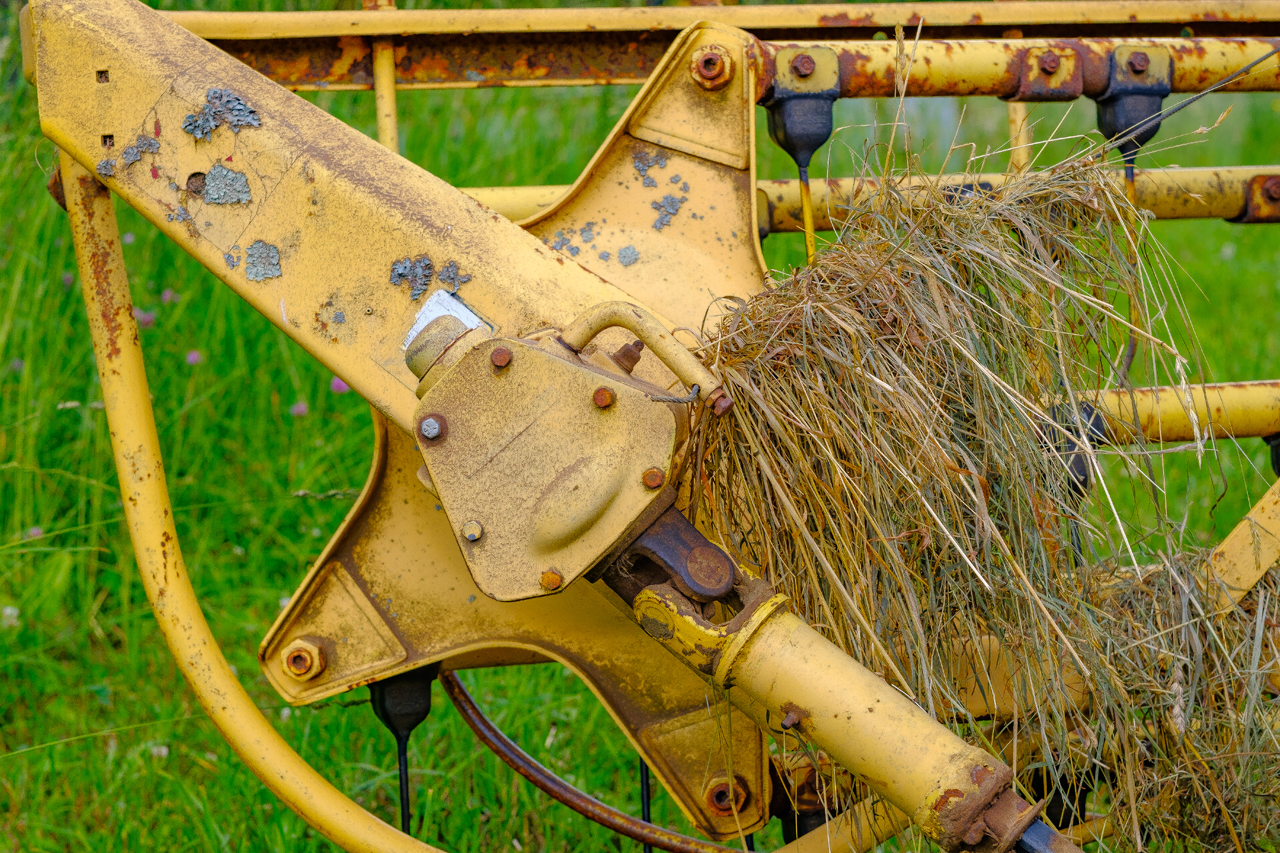

The raking of hay, an art in its own right, did not come naturally to me.
Like in chess, one begins with a blank board, every piece in place,
each man adhering to strict rules of movement. The game is plotted from start
to finish with the plan of attack known before first pawn is played.
I had to train myself to sit for a moment at the head of a field, looking out over the
blank canvas,mowed and tedded, dried grass blanketing the earth.
I sit and play my chess game through,
basing my moves on the layout of the terrain, the shape of the field; the universal
laws of tractor abilities limit my potential movements. I gather my troops,
craft a plan and set out on my tractor to rake the hay into rows.
Once the tractor enters the field the rake begins to pick up and move hay to the left.
You cannot undo this; it’s not something that can be gone over again.
Repeats only bunch up the loose hay and make the bailor’s job infinitely
more frustrating. Like in life, chess, and raking hay I have an easier go
when I have a plan.
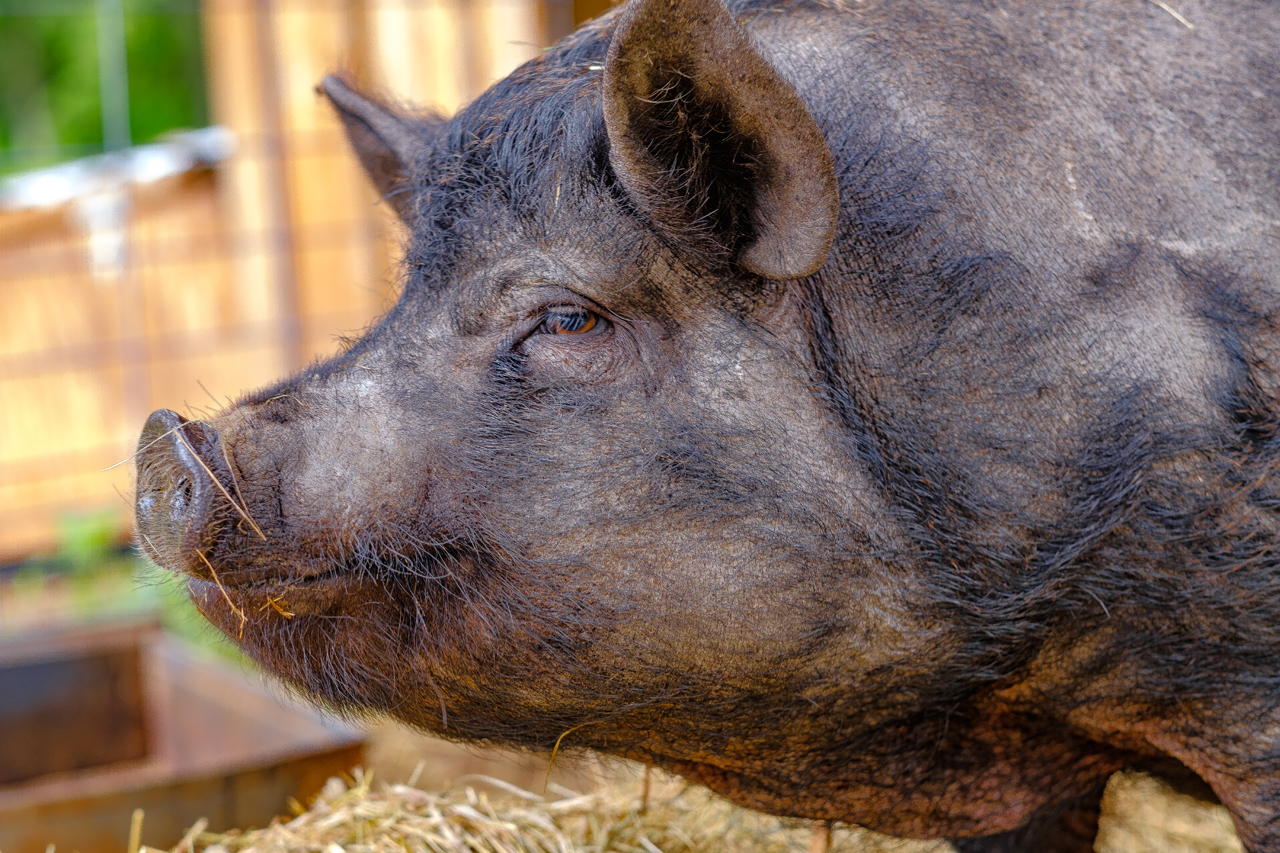
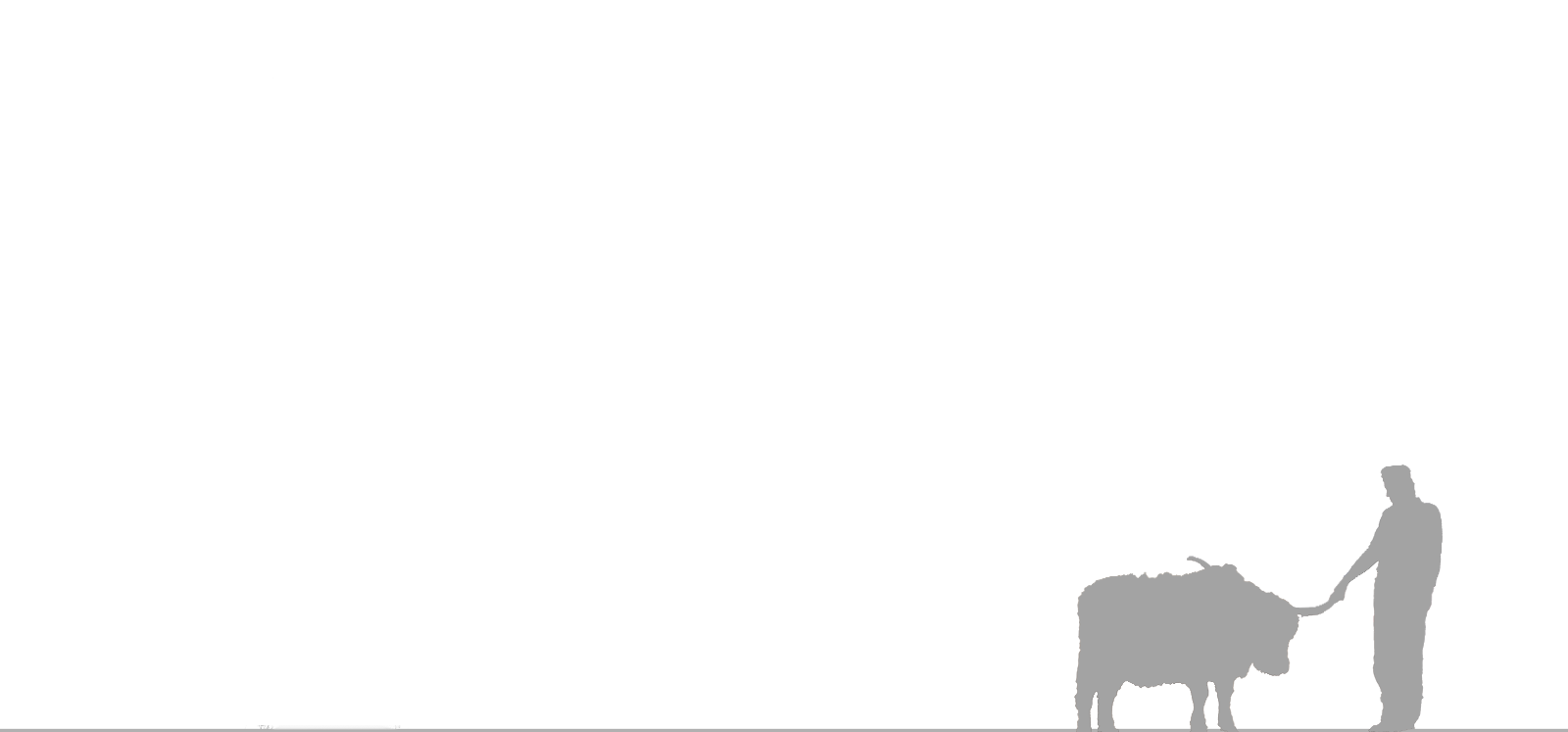
They were originally destined for the pig roaster,
but proved much too fat for human consumption when they arrived on the farm.
This breed is an old style homestead hog, often referred to as a lard pig.
They put on fat quickly on homestead leftovers and have nearly
become extinct due to modern methods of hog farming which entail copious
amounts of grain and little roam around time. Poor things could barely walk.
We embarked on a diet journey for these two: kale and lettuce breakfasts,
garden weed salad lunches, and a handful of cracked corn spread about the pen
for satisfying rummaging. Two years later they are
still here and the best hog mothers I have ever seen.
They had 10 piglets between them this spring, and If ever a pig "came into her own",
these two did when they had their babies. Sometimes in life, one just knows what
to do. Always slightly standoffish and logy these girls became light on their feet
and blissfully attune with the arrival of their 10 creations.
Intelligent and needing a job in life, they found theirs
as mothers and in a day life gained meaning.
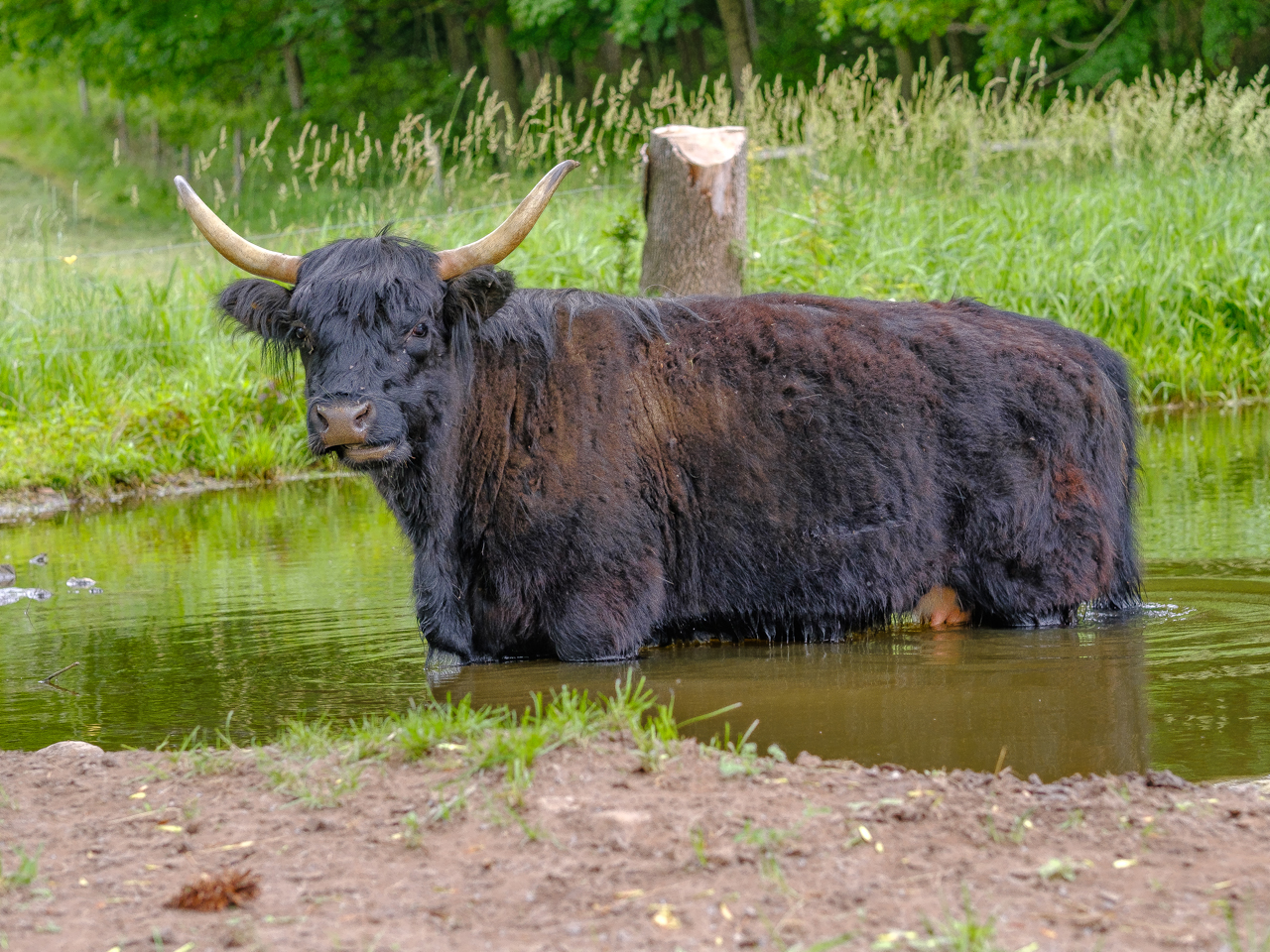

Our herd is late in the season with calving. Most calves are born midsummer, right at the peak of the heat. This is not ideal, as flies and hot days abound that time of year. The pond is a welcome place for pregnant cows to ruminate on the early day's grazings, cool down the core and take the pressure of gravity off the spine. I'm sure the feeling of one's belly floating on the water, lifting it to where it should be without the weight of a small cow, feels glorious. Such amazing intuition these girls possess, having such unconscious awareness of what is best and what makes the most sense. When pressure comes from above; offset it with pressure from below.
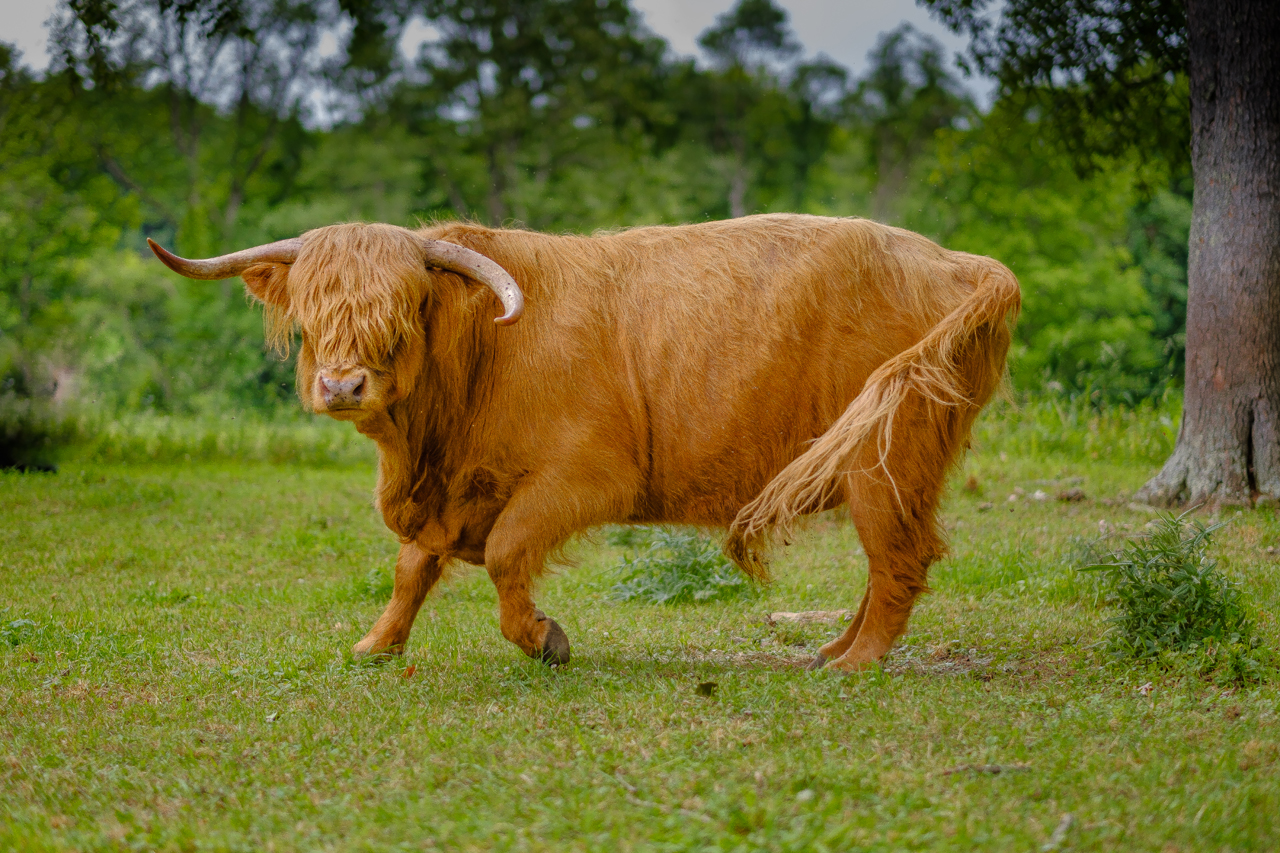

His grandfather was a champion Highlander, his genetics superior and
his personality ideal. A good bull is not intimidating nor should he be unpredictable.
This beast, he could simply level you, but that is not in his interest
and he is intelligent enough to know this. You work with him cleverly,
as he has been around a few years and knows all the sly tricks of humans.
He doesn't get involved in the cows' hierarchical tiffs, because his role is secure.
He is the bull and that is accepted.
Until another bull invades the property and then undercurrents of war
sound from across hay fields. Dark, stormy times descend on the farm even
though beasts be separated by fences and acres. At any cost a duel must be fought
to determine the better man. An epic battle it proves to be. Two powerful animals,
over a ton apiece, gallop at one another on one of those deep, moonless fall nights,
The wind roars through the remaining dry leaves
still clinging to the whipping trees. I remember that night. Daniel leaps
from bed and runs into the night, "The bulls are out!".
Slim, being the gentleman that he is, paces and tosses his head, yet holds back.
The other a less refined male attempts contact, yet is met with the Kabota
head-on and is walked backwards down the hay field. Slim snorts and pops
in approval and the other bull finds himself far from the battlefield with no
place to go but back into the pen. We learned that night that if you want
to keep fences looking nice, you only keep one bull.
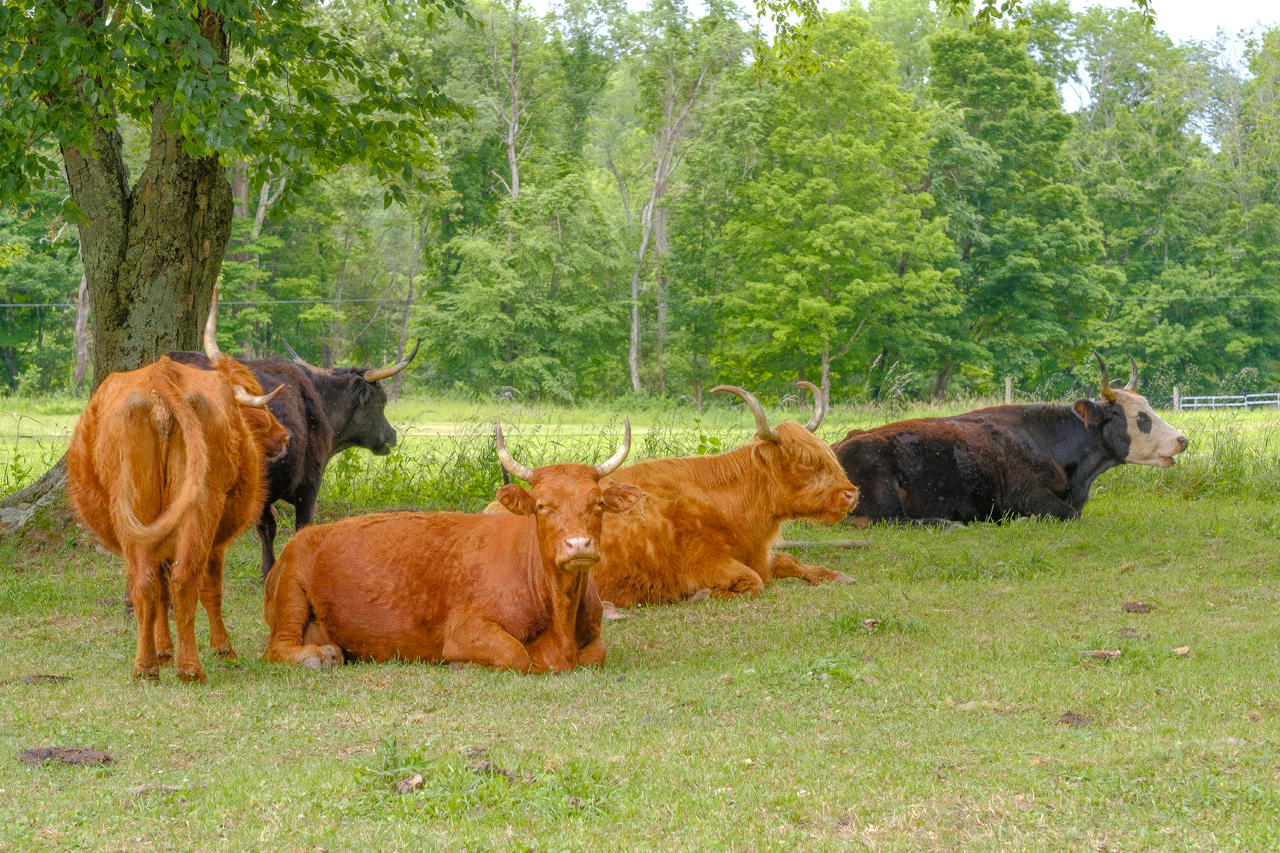

There seems to always be a lull in activity of a herd before calving season starts.
Bellies get uncomfortable and energy settles down.
It's a waiting game for everyone.
Even Slim hangs back and sleeps more and waits.
Then, in late June or early July, that first big heat wave,
everything just starts growing all at once.
That's the time when the tomatoes go from 2 ft plants to monsters,
reaching and reaching for more trellis. The deep green hue of midsummer
encloses the grey remaining sticks of winter and the frantic
growth of nature creates a sense of urgency in me.
More and more faster and faster, weeds get bigger, multiply
and the overwhelming excess blooms in an
abundant array: then it's calf season!
I never knew such bounty could happen all at the same time.
This farm life is all in or all out, summer with its excessive activity
and winter with it's deep introspective freeze.
I welcome the seasons as the roll in; the change from
excess to deficiency extraordinary in contrast, but the consistency
and certainty of its cycle comforting.
The calves are born, the season settles down and
weeds slow in their growth. The land and I can rest for a while.
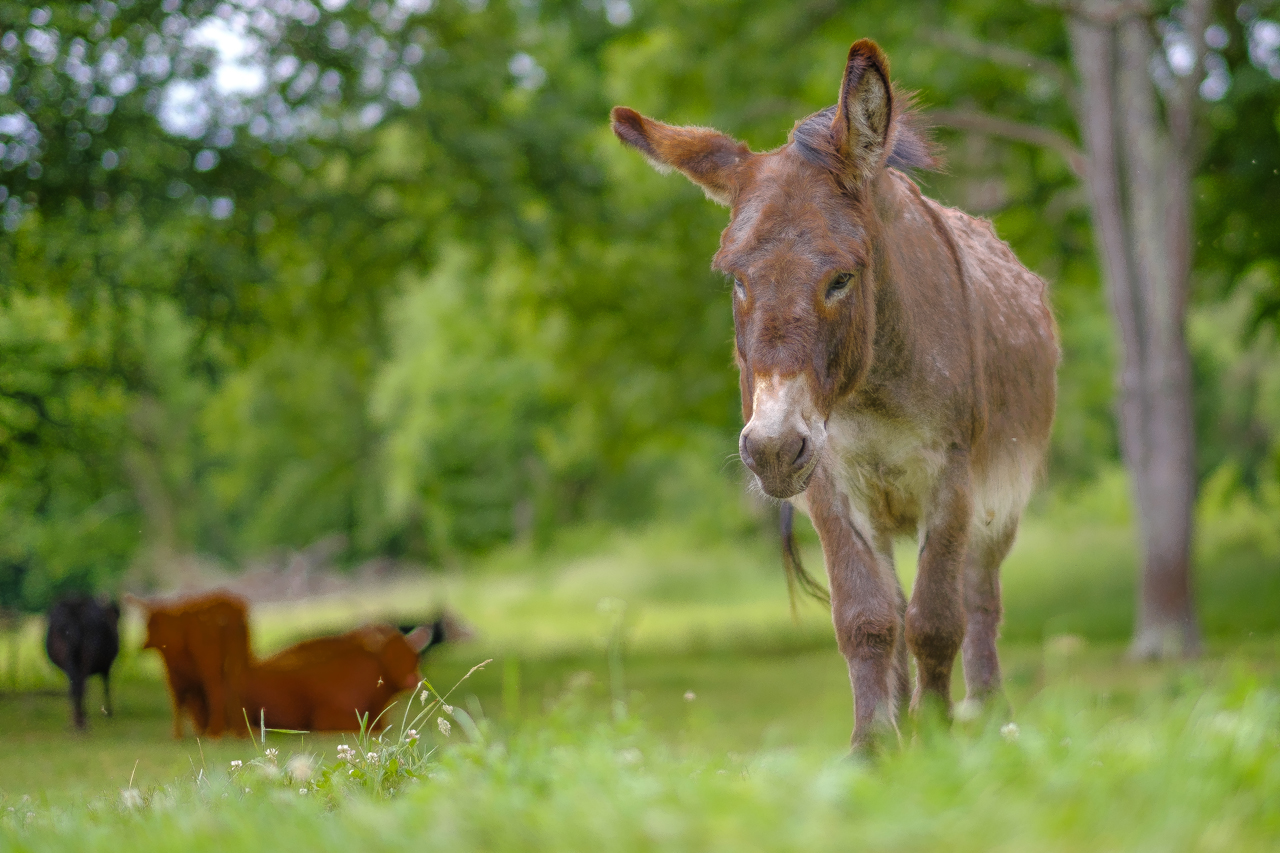

I sense sometimes that donkey, even in his stoic -ness, resents the
close ties of a cow herd. Donkeys are solitary creatures by nature.
Sometimes I see him on the edge of the herd, observing
yet aware of his disconnection. I'd say of all the barnyard creatures,
donkey is the most complex. His intelligence is that of a grumpy 6 year
old child. He brays and sulks if he thinks I am forgetting his hay flake
and is coy when he wants attention. He resents
perceived slights and acts out when he feels things are unfair.
I imagine Donkey as a person as he peers at me. His this brow bones give
him a suspicious look. I wonder what he would be like as a person,
who he would be and what he would do for a living. I imagine him as an
IRS tax auditor usually, following set rules just because that's the way
it's always been, regardless of usefulness. But then he'll surprise me.
I will find him grazing by moonlight; everyone else is asleep
and he roams his court basking in the milky night,
pensive in the lull and calm in his security detail.
Then sometimes the donkey, as poet: I imagine him like Charles Bukowski,
postman by day but a dedicated writer in spirit. He gathers his twisted
observations of the human condition and ruminates in the complexity of it all.
That must be why we get along. He has his favorites, definitely. Don't we all.


They don’t drink a lot of water and their
diet must consist of 90% fibre – dry desert grasses and tumbleweed sages.
We had a field that hadn’t been hayed for a while. The weed stocks were
thick and stringy, small trees grew and the grass had re-seeded
several times. Daniel mowed, we baled and stacked it in the barn.
Given a choice between fluffy green 2nd cut and what is now
affectionately referred to as donkey hay,
Donkey chose the latter at feed time with gusto!


It is my most favorite flower; the bees love it too! It grows neatly upward for the first foot and a half, but must be staked up right away or with the first rain it will sprawl over the ground each branch growing upward to the light creating a knotted hot mess. The bees will love it tidy or sprawling, though, and they are the main reason I grow the plant. The leaves and flowers are tasty in an early spring salad, too.
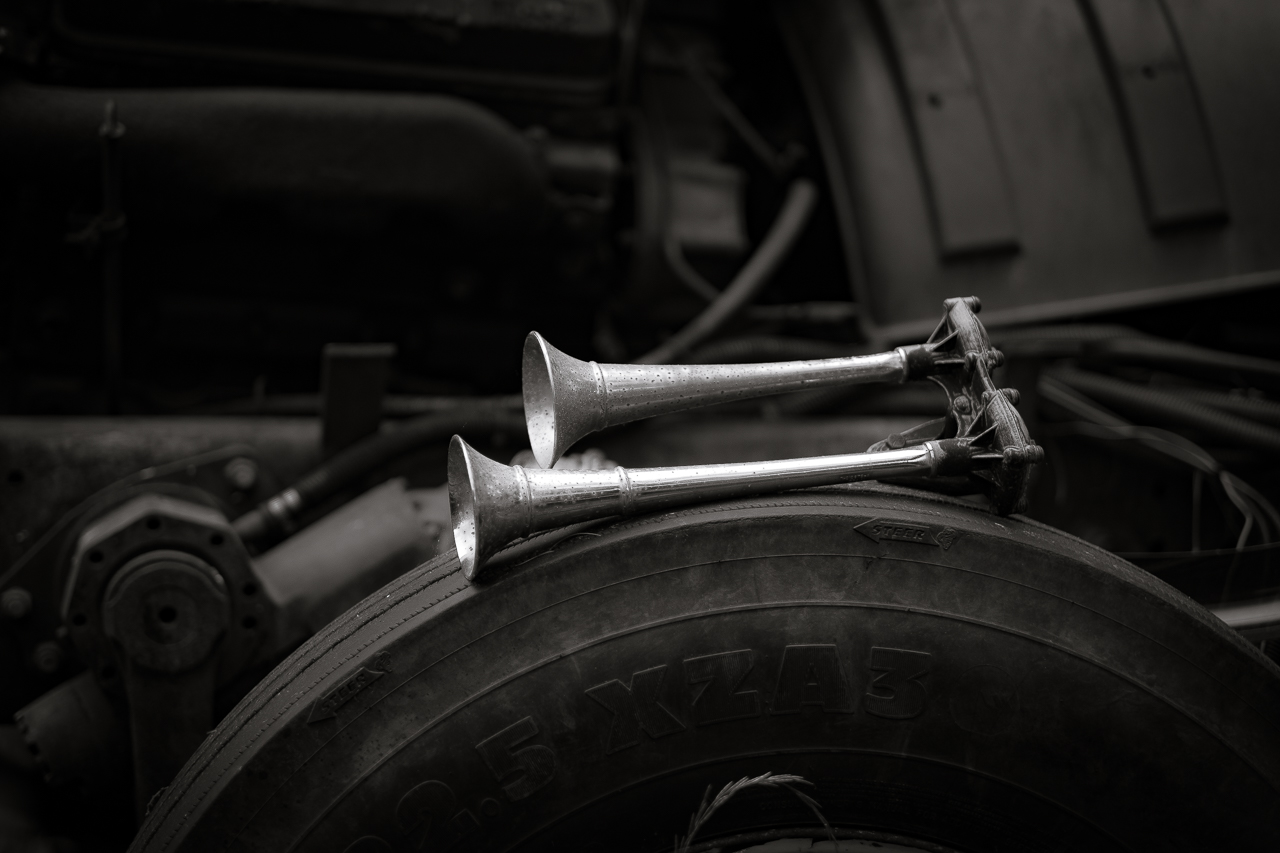

There’s a certain type of person who can build a whole truck
or building or empire around seemingly forgotten parts and pieces.
In their mind is the finished product, perfect in its minutiae and grand in scale.
This life, the farming life, is really built around parts and pieces.
A far off vision exists where gates latch with ease, animal moving gets
easier and systems grow more efficient. All the parts piece
together, work in unison, exist in the mind but must be translated into
action, one piece at a time. The collecting of parts is never-ending
to fill in this Swiss cheese dream; these unfinished clockwork mechanisms,
awaiting the final piece to begin ticking.
They look strewn about, these parts,
but they will find their home someday in a grand design,
in the final vision, in a very small part of a very big whole.
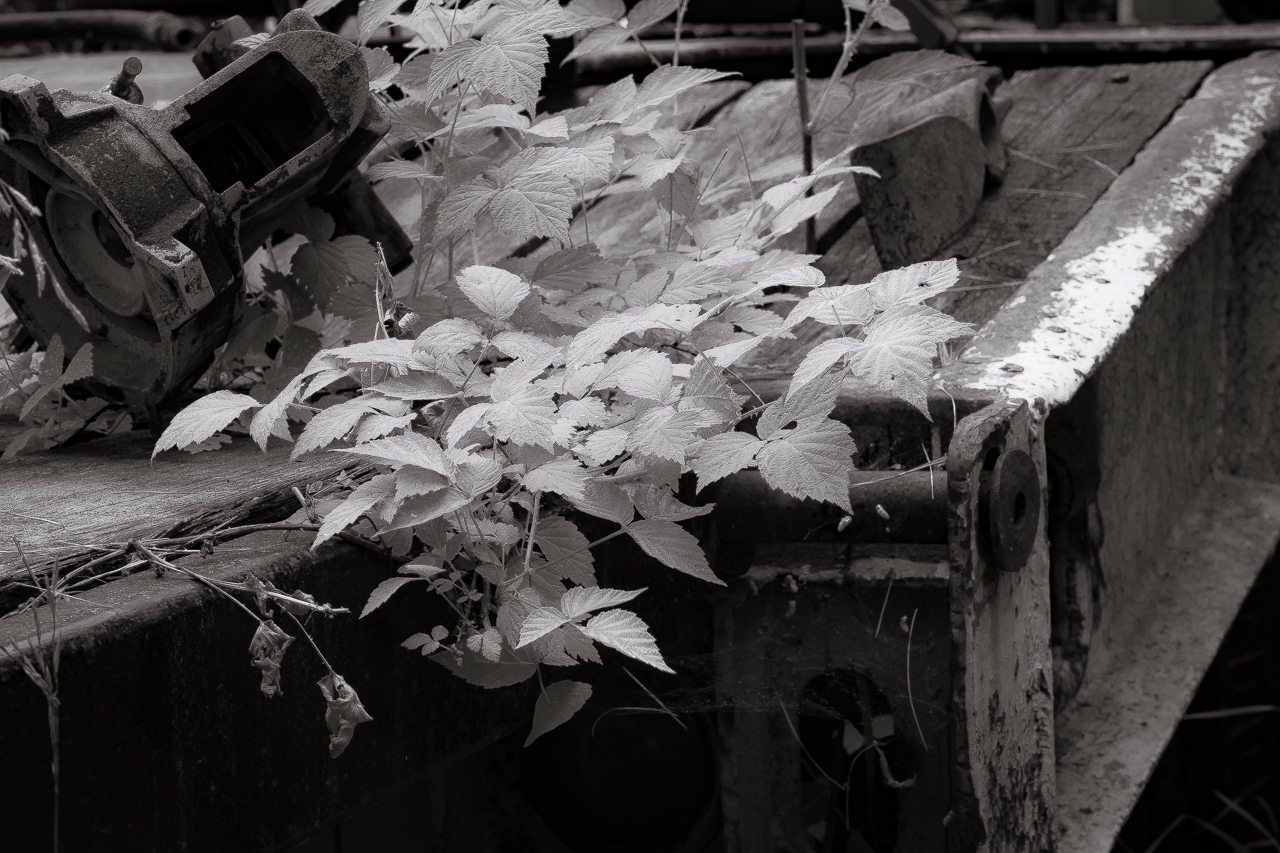

These are the remnants of past lives, eras finished and the wreckage or
treasures put to rest for a while as new eras get built.
Trucking stories abound of Detroit Diesels,
and badass cow dogs riding stance legged on the tongues of lowboy
trailers delivering hay and big iron into the heart of NYC.
The glory days, maybe, but perhaps the best is yet to come.
It’s true; some of the characters are buried now, like RaRa,
the good old cow dog mutt, “He’d fight coyotes just for sport”.
But Glory days and eras never last forever; new characters
and new plots and lulls where the purpose is to build new ones.
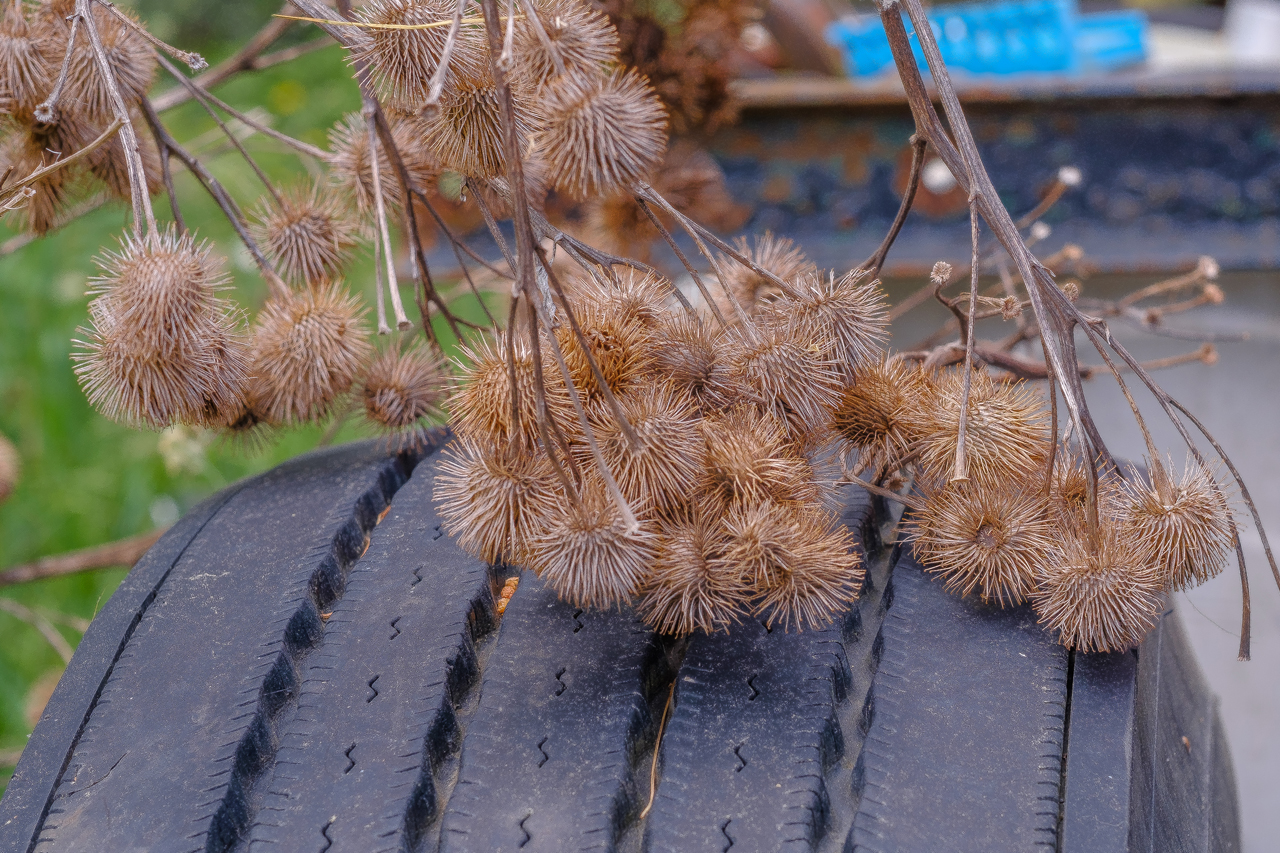

The Highlander fur is long and catches sticks and burrs.
This creates a big tangle and mats the coat so it’s heating
and waterproofing capabilities become less than ideal.
We try to keep the burdock out of the fields, at least,
and it doesn’t grow well in the woods. Burdock is
a wasteland plant, only growing on field edges or areas where the pigs root up.
The cows spend the early hay growing season off the fields
in the woods surrounding the farm. It they have any burrs,
which usually set in the chest and belly fur, their early summer gallivant
through the thick New England multiflora and barberry
will comb out and leave their coat smooth and sleek for winter.
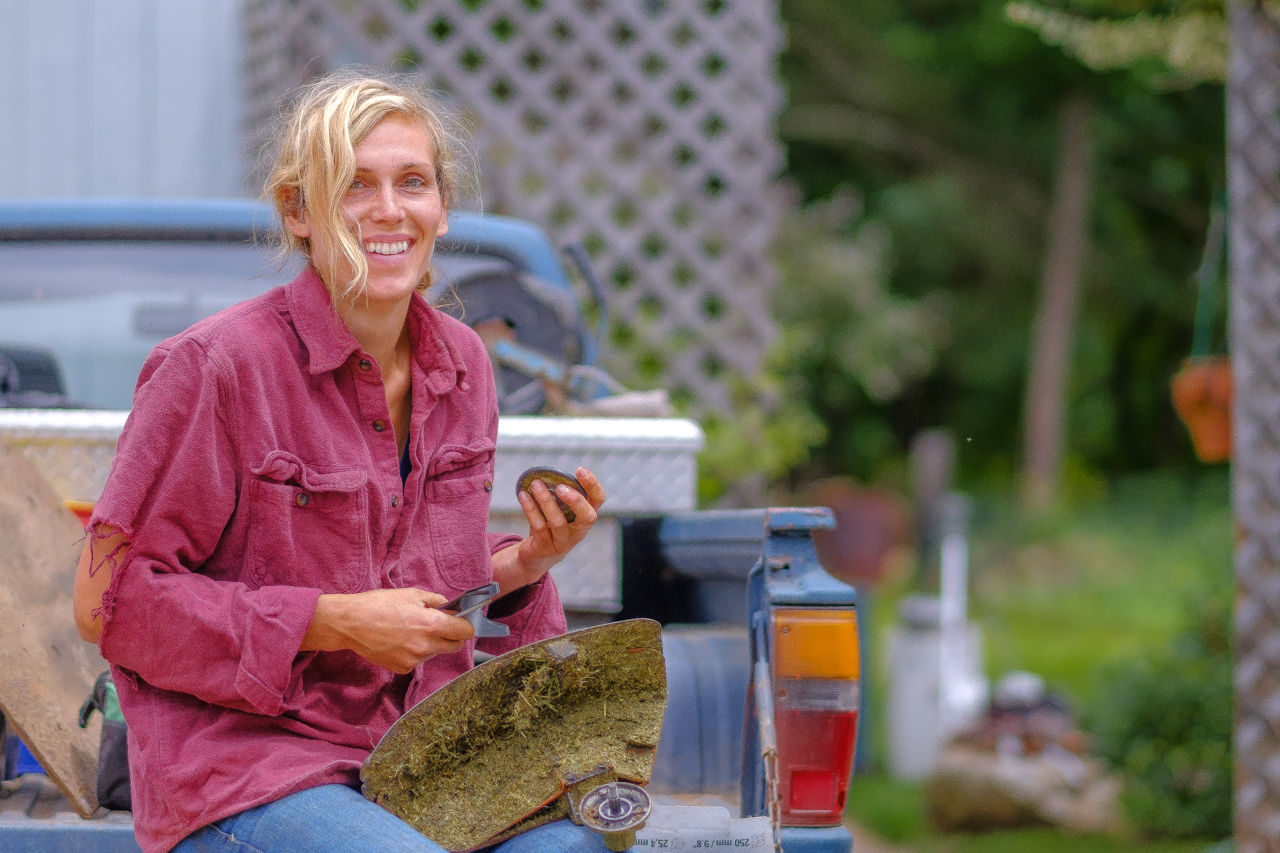

I learned to drive stick shift in a teal green Toyota Hilux on an estancia
in Argentinian Patagonia when I was 14 or so. My dad taught me how to drive stick
and to memorize my multiplication tables with the same style of teaching
– that way he had of holding back his frustration just enough,
yet instilling the fear of god in me, so as I remember
to this day how to do both pretty well.
I’ve always had a fondness for Toyota Pickups, because that’s what he always drove.
I like the old ones - late 80’s, 90’s era Toyota.
They were made out of the shit steel but would drive until the body fell out from
around it and probably would still turn-key if the valves didn’t drop.
I bought my first Toyota, matte blue, ’86,
carbureted and I often think of him when I drive it.
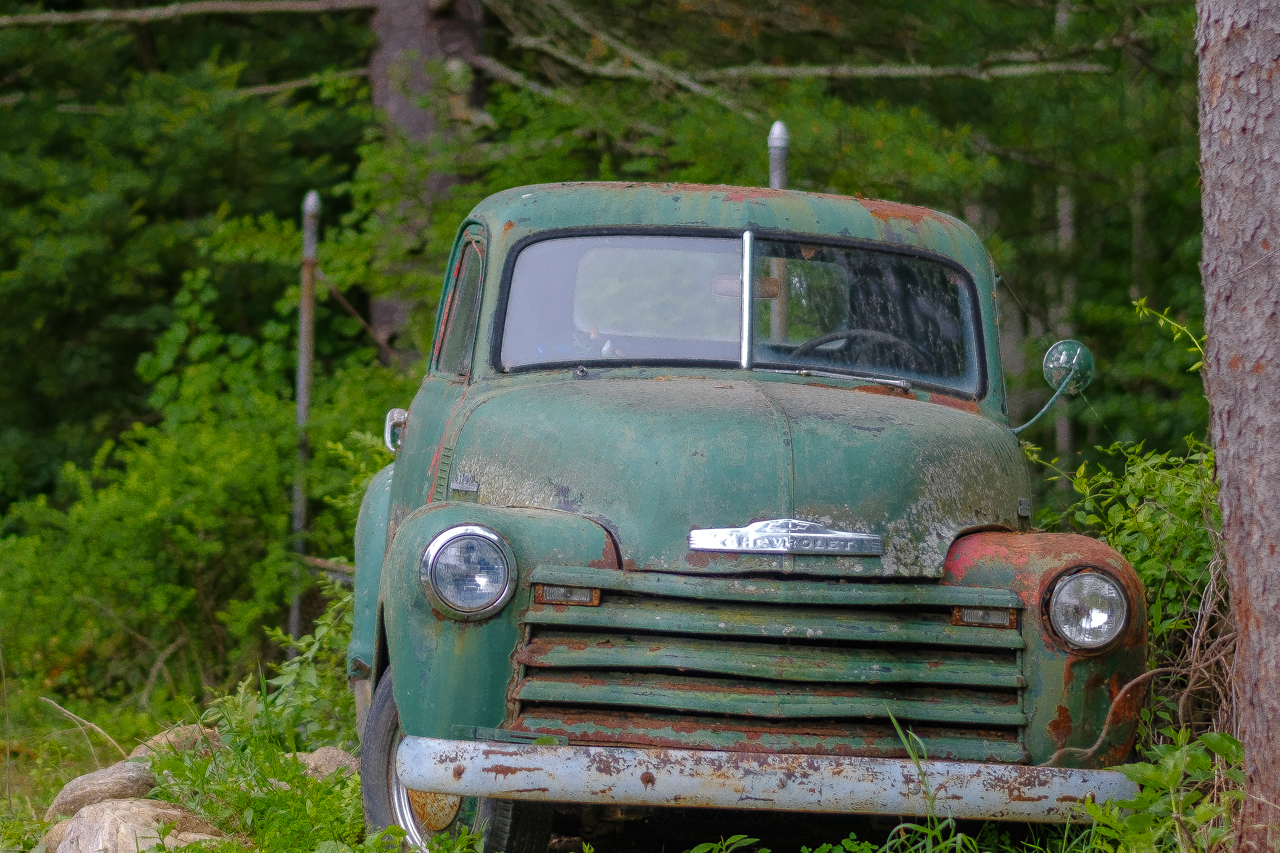

The ’52 Chevy, doesn’t run, but I have every intention of figuring
out how to get it going. For now it greets people driving down River Rd.
I smile every time I pass and at Christmas time it gets decorated
with Gramp’s old big style Christmas lights. It’s been a constant
on the farm during so many changes and for 3 seasons has been there
greeting me when I turn into home driveway.
I think I will keep it there for a while.
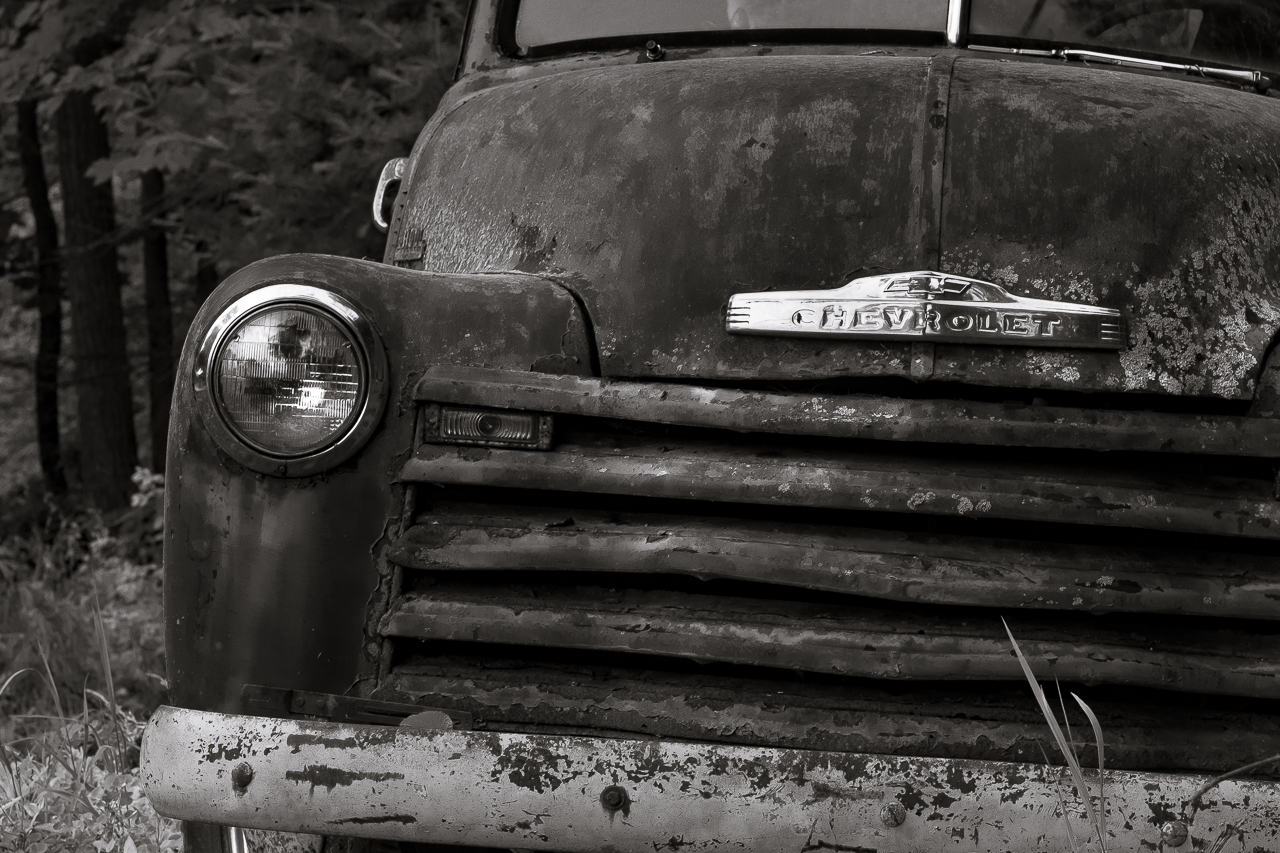

I imagine this truck has been many different colors over the years.
Paint chips suggest red at one point and it appeared to be an auto sales
vehicle by the lettering on the door revealed two paint layers down.
I can imagine a car salesman in the early 60’s or late 50’s
with his wool wide brim hat that he sets gingerly on the seat beside him
before pushing the clutch to the floor and turning the key.
The engine rumbles to life and down the road he goes to make his rounds.
A simpler time, they say, “less noise and people drove slower”.
I imagine any time in history would be a simpler time than now,
but the truck sits and I dream of the day when she runs again.
Maybe that day will find the world has calmed down a little. We’ll see.
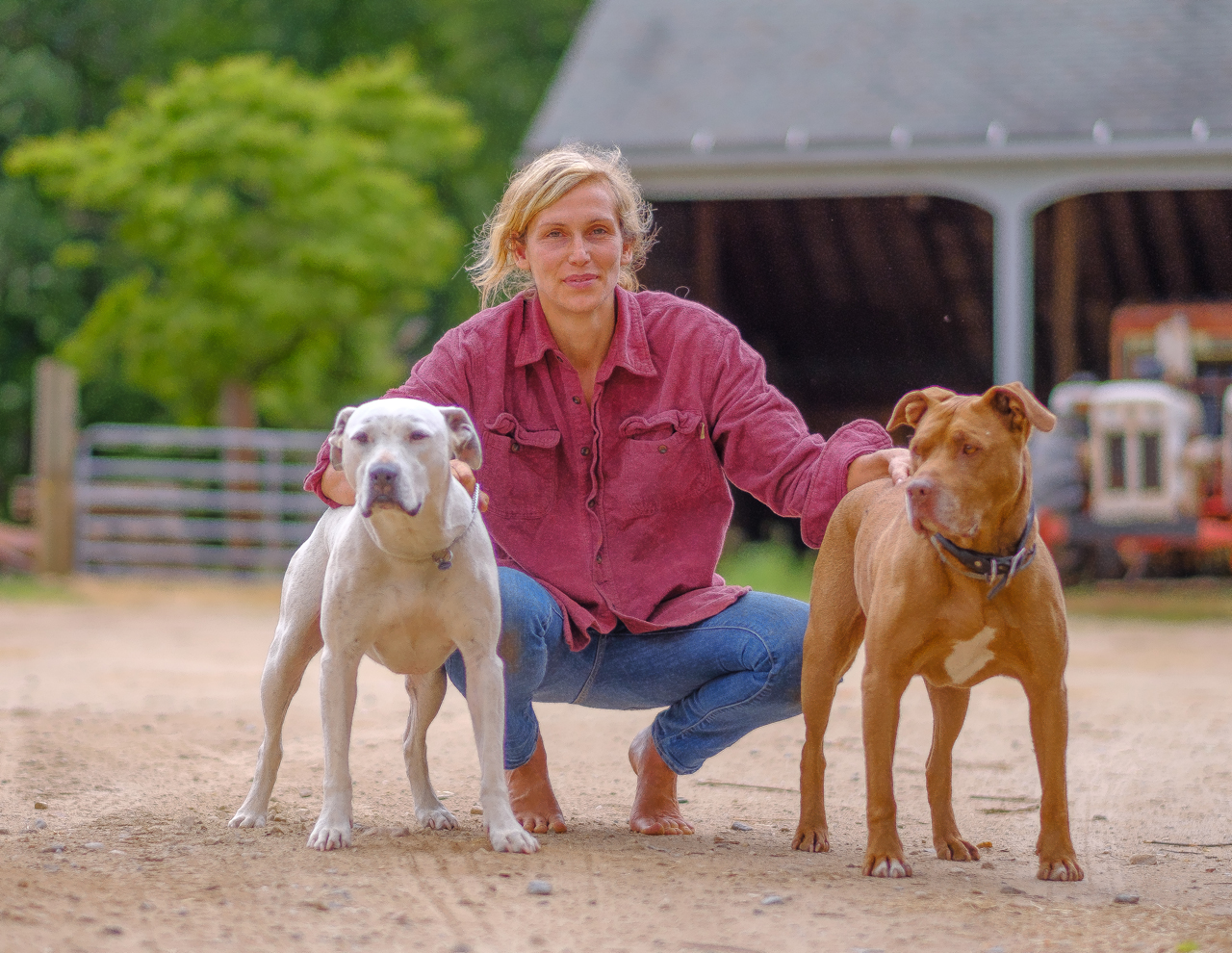

Coco, the brown one,
is a joyful beast with incredible levity and constant
awareness of the small rodent population.
The other one, Bell, occasionally reverts to her old behavior
patterns of a Waterbury stray, scrounging and having a loose screw,
but she’s “come a long way” as the phrase goes.
Coco, is boss of the two, having inherited the roll from RaRa
the old cow dog who shuffled off the mortal coil a year or so
ago to enjoy perpetual fall days and all the coyotes he could possibly fight.
The transition was smooth; Coco took the roll with ease and he is steady in it.
Bell is comfortable in second shift, as she is deaf and possibly less
gifted in observational pursuits than Coco, but they love each other dearly.
I will catch a brief display of reverence and adoration
as Bell sleepily licks Coco’s ear or Coco refrains
from stealing back a treasured cow bone from Bell’s greedy pilfering.
Great dogs, the pair of them.
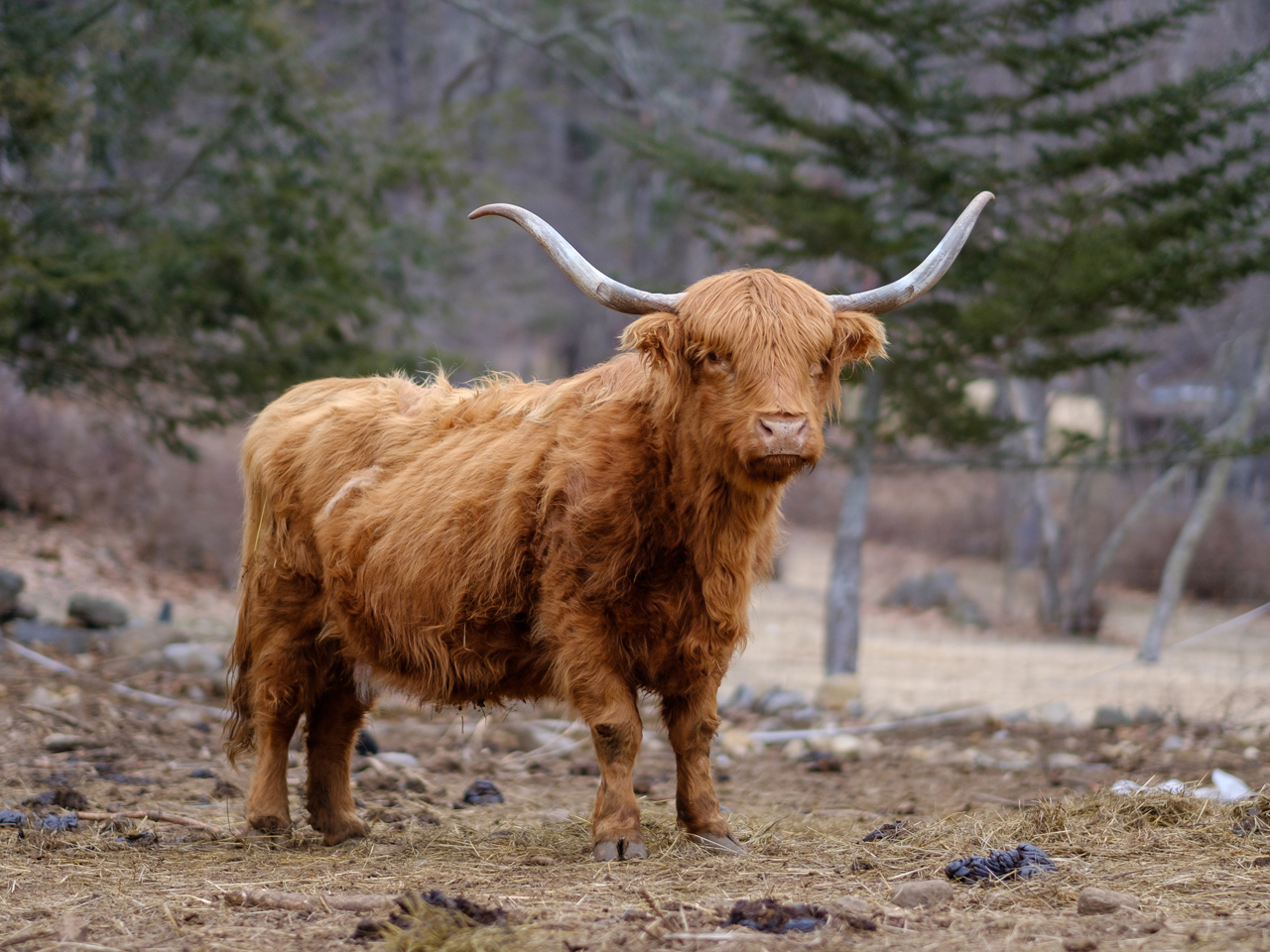

I’d say she has a horn span of five feet - Mama Longhorns,
as we call her, has been a consistently good cow.
She was one of two cows last year that bore twins,
the other being Pesky a white faced and stout bellied old girl.
Mama Longhorns utilized the pond religiously for its glorious cooling
and weight re-distribution effects.
She was nearly the width of her horns that year.
She is probably the most “highlander” of the herd,
besides Slim the champion bull, and is the customary
short stocky and tough as this breed is known for.
I’d say the tendency for highlanders to throw small calves,
saved her from possible miscarriage, but I’m no cow expert.
She has won herself exclusive big cow grazing as babysitter
for the rowdy bunch of yearlings and this year’s calves as
she is growing older and could benefit
from a half year break from calving again.
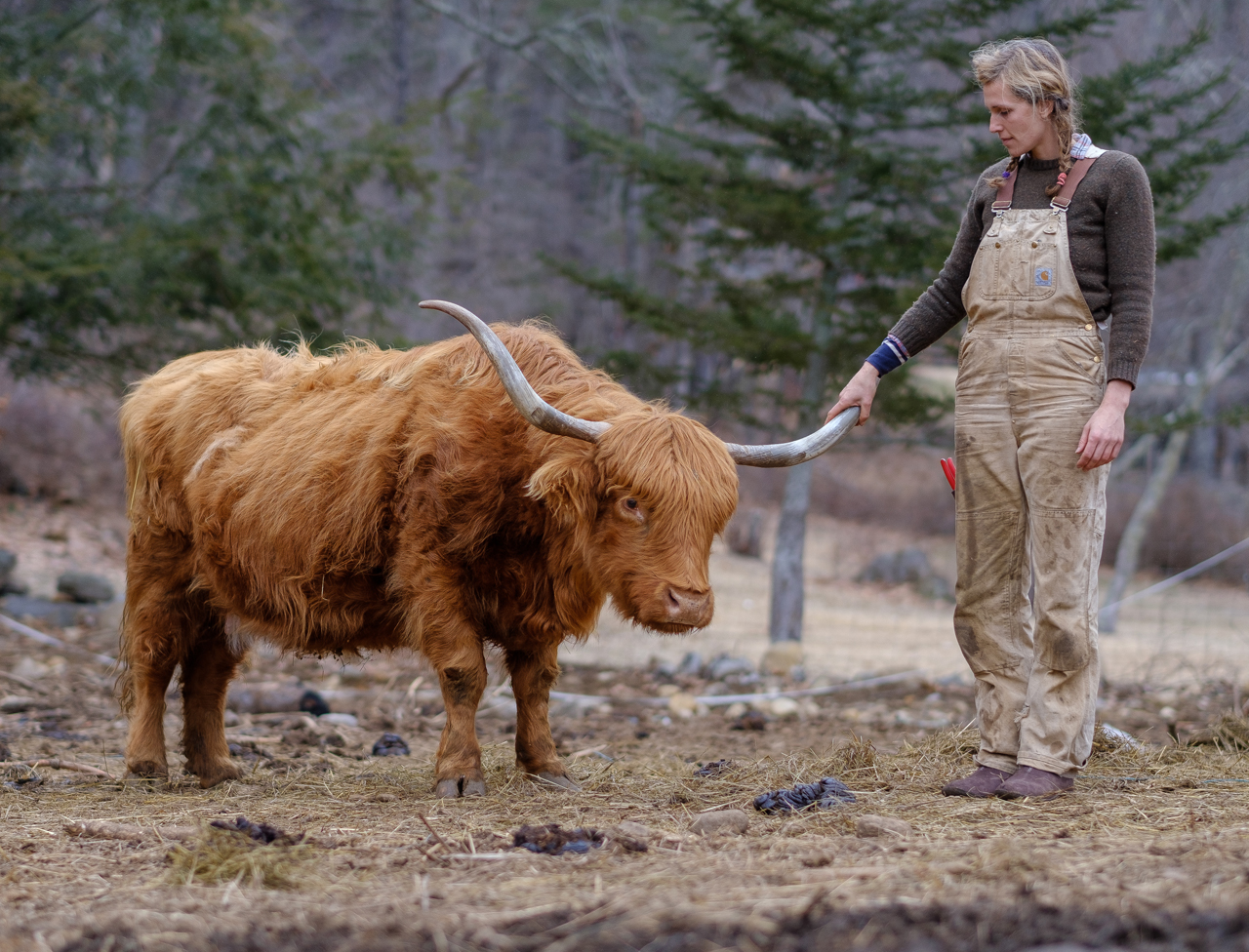

There is something humbling in the connection with a creature like Mama Longhorns.
She knows me, and she knows I come bearing food or company and never a rude
encounter unless the herd is being moved. But even then greener
pastures are on the horizon.She’s never made me feel like
she didn’t want me around and I hope the feeling is mutual.
I’d like to think unspoken modes of communication
are stronger than the verbal ones. I’ve heard a few empty promises
in my time and a hell of a lot of words that just might have been better not said.
Being and doing has always been a more useful way for me to be honest and connect
with the world and words just always seemed to
fall flat in some of the more meaningful moments of my life.
Mama Longhorns knows this, I’m pretty sure.
Her quiet presence, often where I find myself in trying moments,
beams louder than a thousand words and makes a lot more sense.
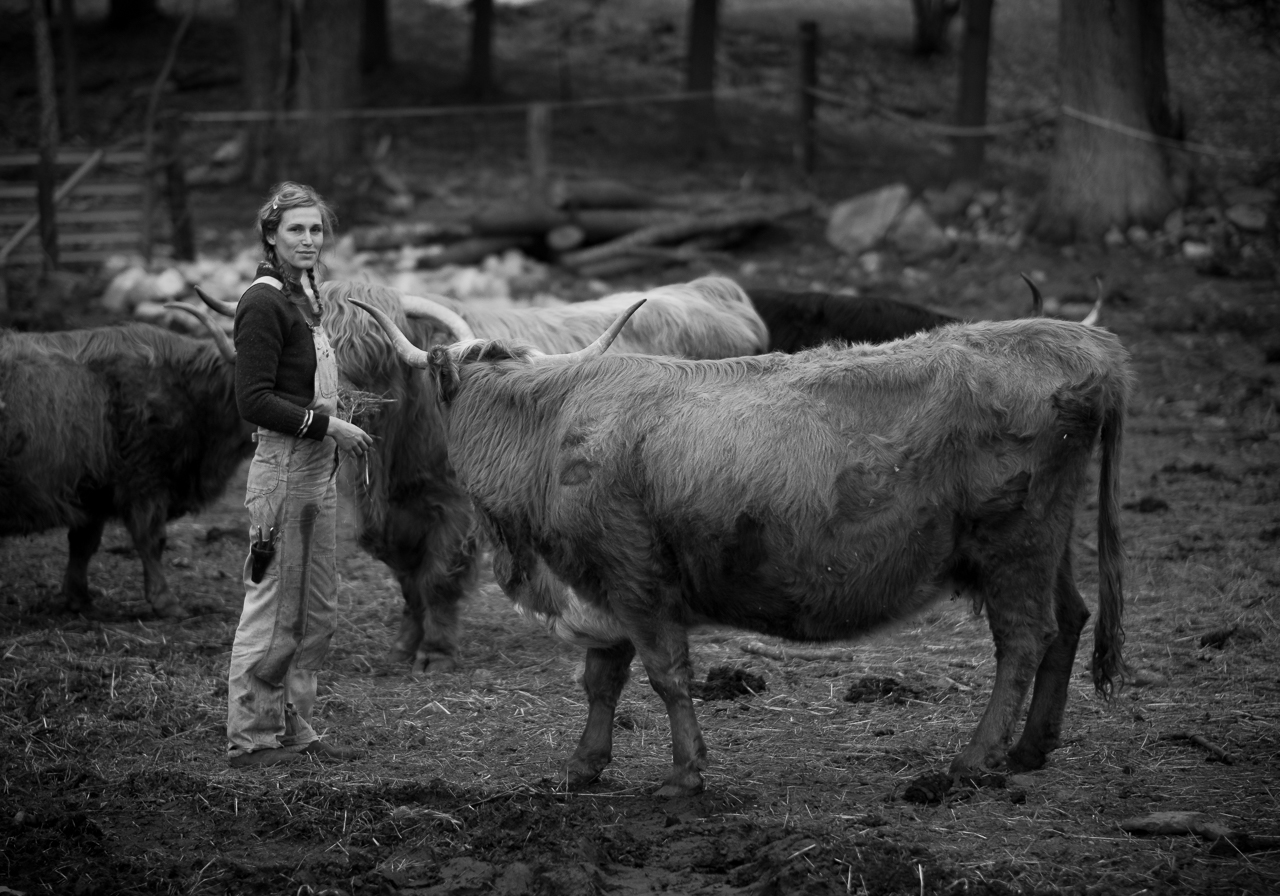

Old Girl Pesky, my best girl, the one who will lead the bunch,but only with
the bribery of a grain pail. She’s a good cow,like a beleaguered mom
of several, she’s figured out how to just be happy in the midst of the chaos.
Disinterested in BS but attentive when needed she just keeps on trucking.
I’ve been told that my great-grandfather raised white faced cattle
out in Wyoming the later part of the 20’s until the ranch sold
around the time I came into the world. Even then you couldn’t make
a living farming, really, not a good living.
but the farm kept the family alive during the depression.
My great-grandmother was a teacher, in the quintessential
one room school house and made the farm lifestyle a possibility
for her family. I suppose raising cattle is in my blood,
born of interests and talents that just don’t quite fit in the work
force of today. Really all that could work as a profession for me
is farming and the supporting roles necessary in the operation.
Like they all say, “farming isn’t easy”, and sometimes the life
is downright crushing,but still, despite it all,
I’m not disillusioned yet and neither is Pesky.
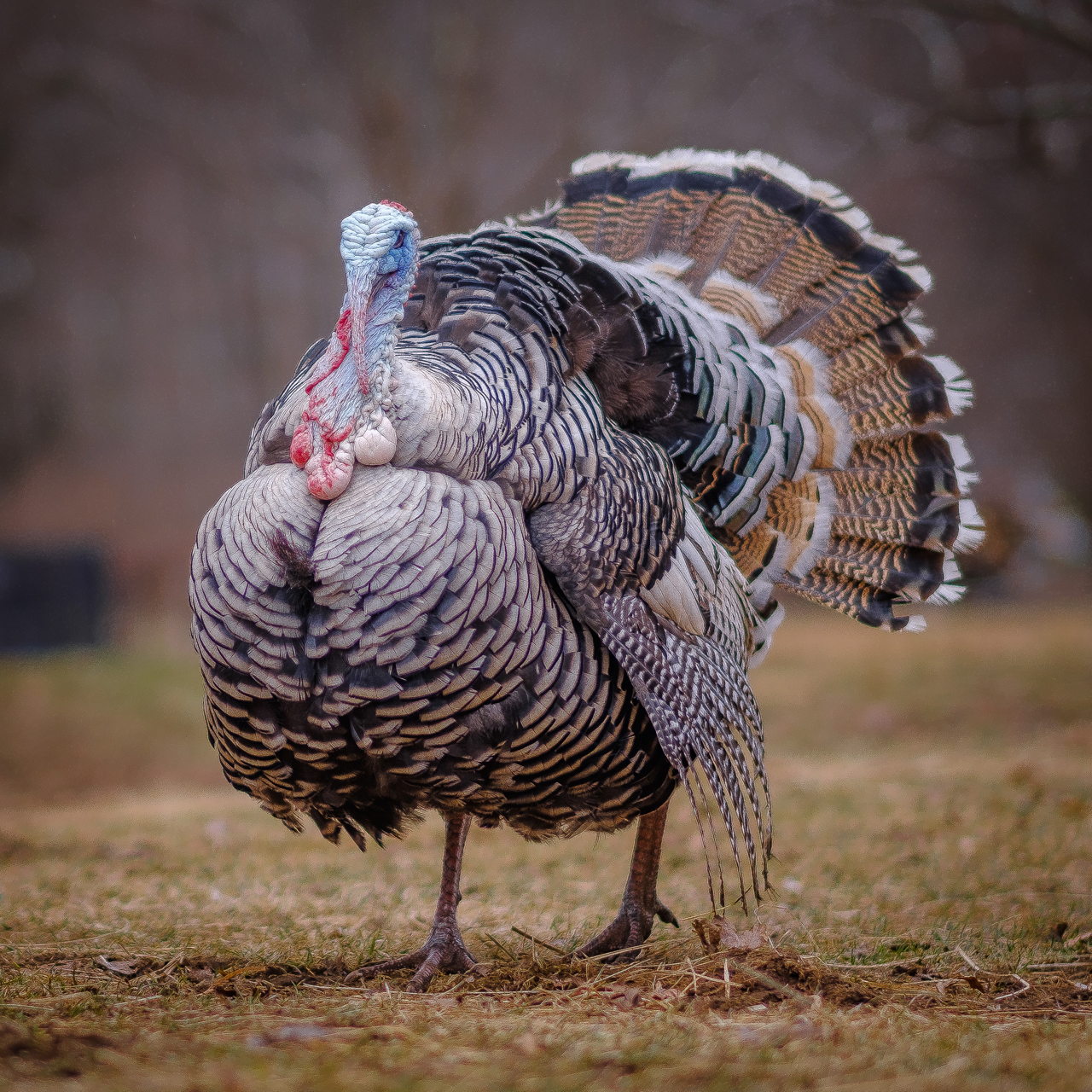

Relentless in is vanity and desire to be
revered by his females, he would puff and stomp his bad self around the courtyard.
He and his harem were known as the flying monkeys. Chore time I would pull
up to the barn and let out their call, “TUUUURKEY TROOOOOOOUBLE!”
and across the knoll from the mid hay field they would come, soaring and jumping,
part running but mostly flying down to the courtyard from their
early morning field grazings. Like the flying monkeys in Wizard of Oz
they would bounce land and walk a few steps with their enormous wings
outstretched before they would fold them back in and resume land bound striding.
I didn’t have the heart to pen them in and free range poultry have short
lifespans in the wilds of New England. The reality is the close proximity of civilization
to any remaining tidbits of wilds in New England regrettably causes the wildlife
to sustain themselves on the livestock of local farms and the
fowl of backyard chicken keepers. And so, for sweet freedom,
the turkeys paid the ultimate cost and met their maker one night in early spring.
But in their day, the turkeys were glorious.
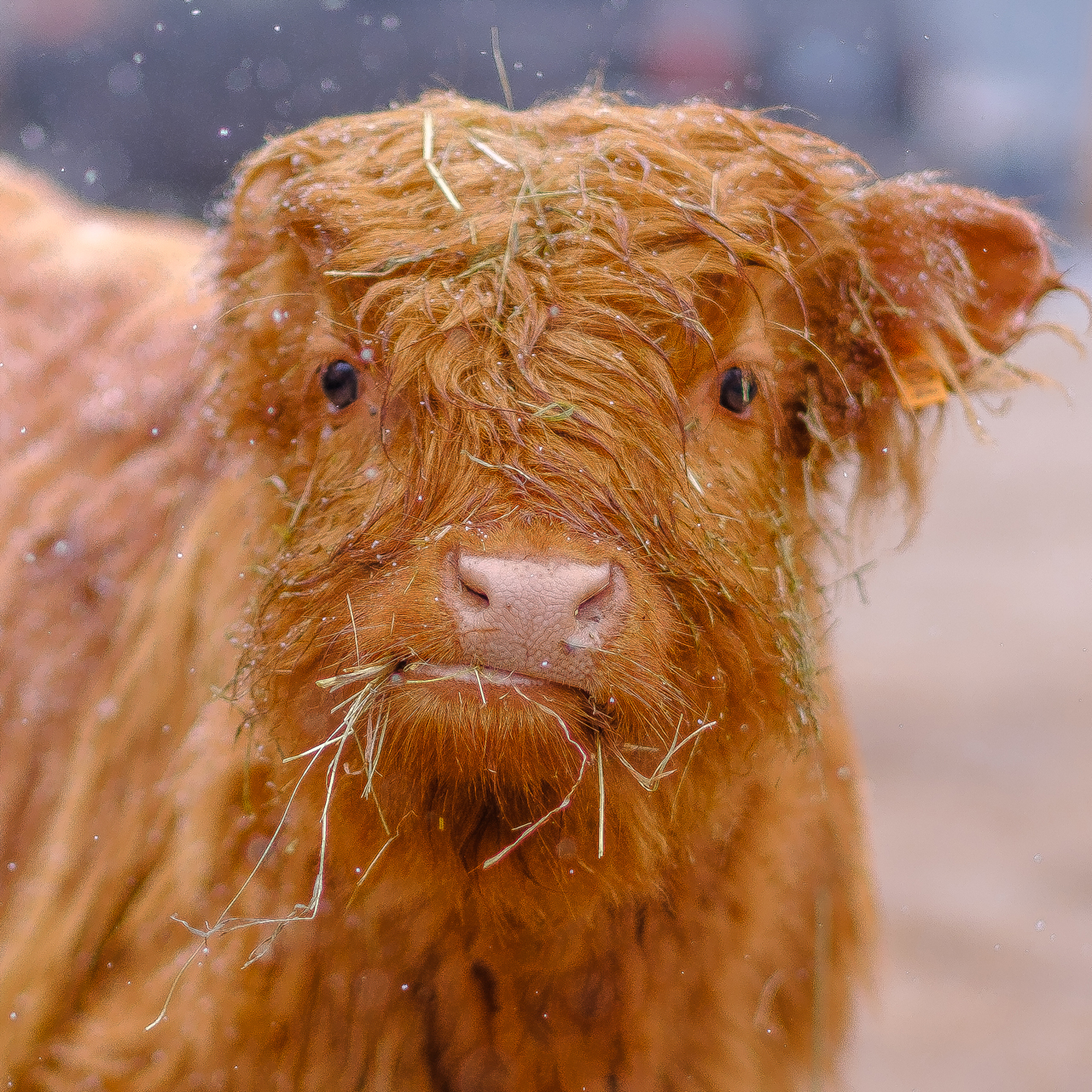

There is little hope of getting Master Maggottician, the grand Maggot of Mirium to do
what you want him to do, which is primarily to stay within the boundary of fences.
Not much to ask, but a free spirit cannot be contained and much to my chagrin,
if there is a way out, Maggot will find it.
I don’t think I ever told the story of Maggot’s illness and his subsequent naming.
He was born 2nd to the last of the calves in our first calving season.
In the depths of Dog Days of summer he came into the world. It was a particularly
bad fly year and wet, really wet, so the day sometimes went by without drying the
undercoat of the herd. I had never heard or flystrike and had no idea that fly larvae
could cause such havoc. I found the poor fellowteeming with fly maggots - in his thick fur,
in the skin, in the crevasses of his thighs and rear. My heart sank, but in times
like these the heart does little to heal such injury, action precedes all.
I hauled him upstairs to the bathtub, maggots dripping onto the floor in the stairwell,
and I washed him.Then we powdered him with fly powder
and used the blow dryer to bring out the awful things.
He was in tough shape for a little while, and so was I.
I think that event was a defining moment in my adult life and I realized that
day that my job here, on the farm, was an important one.
Not just Roxann as nurturer, carer of critters, but as buffer from accident,
death, injury, illness. Our herd is only free of casualties as far as our
observance of details reaches.
Details that could mean the difference between dead calf or live calf.
Hes fine now. He roams around and does his thing like nothing ever happened.
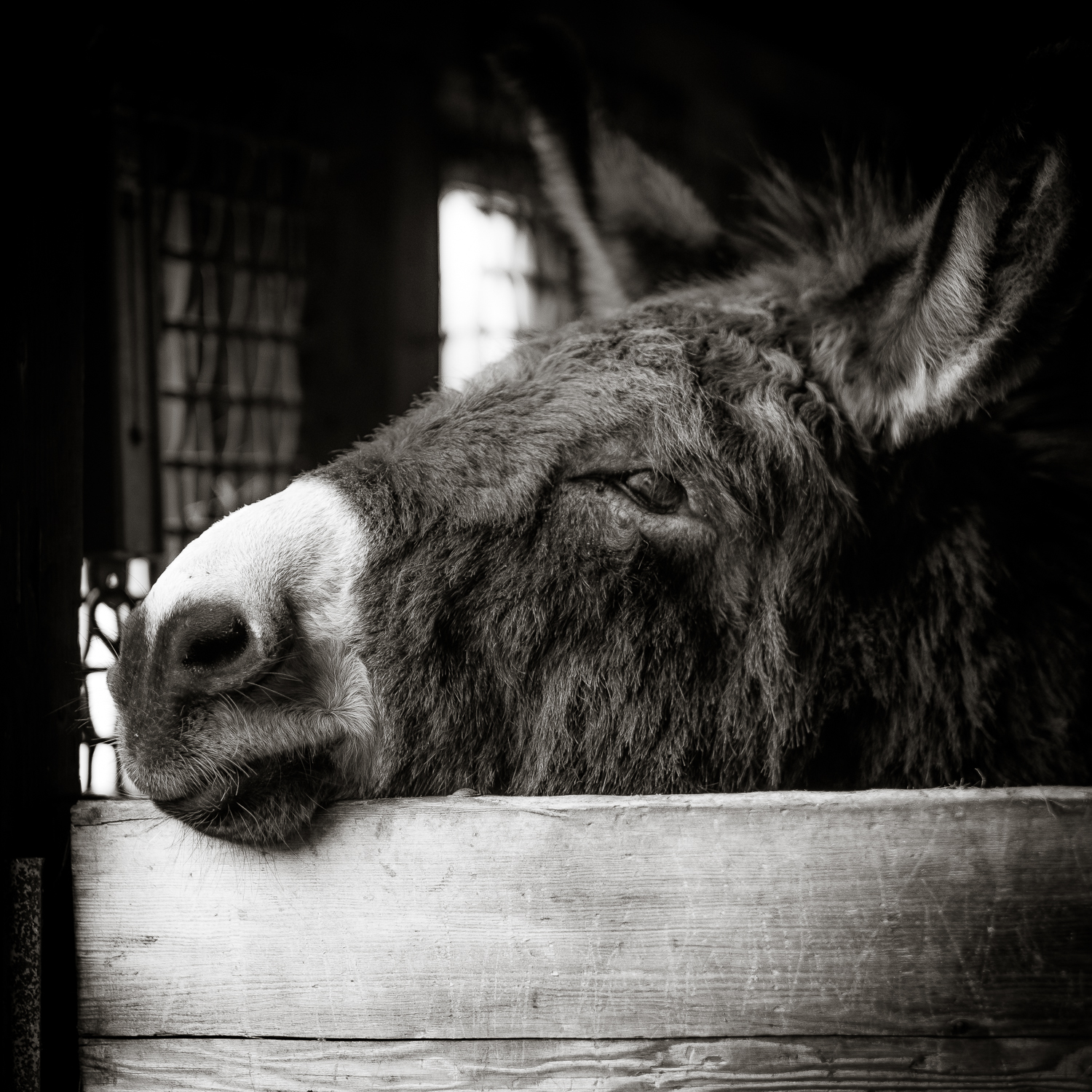

I've become accustomed to the same woolly face looking at me over the worn-smooth oak boards of his stall each morning. Fransoise Wee-air, bastard son of Pierre the French jack and some poor unknown Jenny caught off guard. Born into one of the last remaining circuses. A carny at heart; he knows just how to get what he wants, and decides in 5 seconds of meeting you whether he will deal with your bullshit or not. But he loves his people, he really does. Long sits we have, ruminating on the absurdity of life and the strange realities around us. He munches on his breakfast hay, observing the roosters as they scratch about, oblivious to anything but remnants of spilled oats.
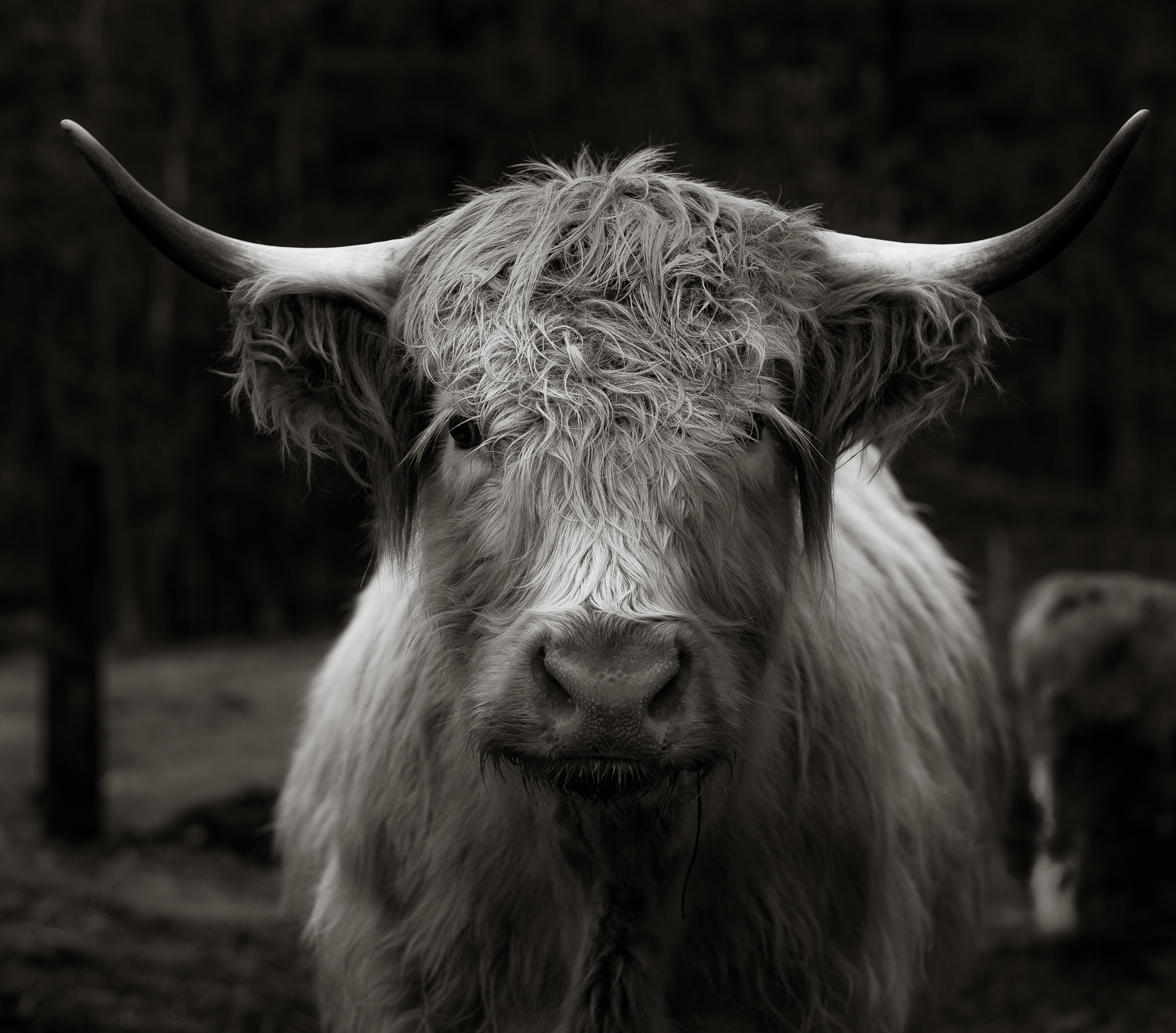

Unabashed, a cow will stare, unwavering and also completely non-threateningly. The million mile gaze of Pesky is comforting as she chews her cud in bliss, only snapping back into consciousness when I say, "you a big girl, pesky? you a big mama?" She wonders for a moment, what it is that I want and then resumes rumination. A steady soul, a gentle presence, and a consistent hay hog, Pesky is comfortable as herself, needing no validations nor ego boosts to be totally and un-apologetically herself.
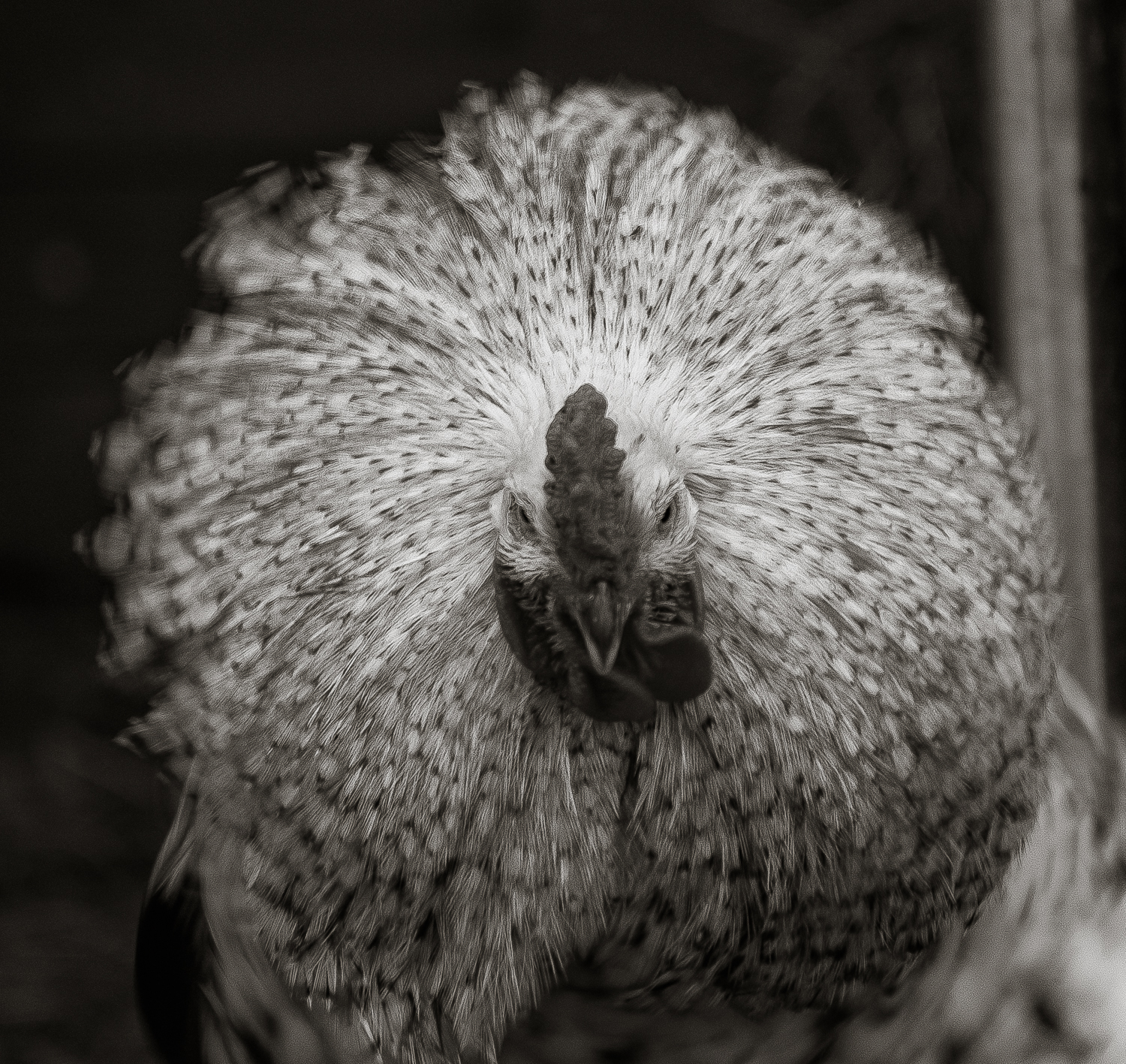

Not being necessary to the utilitarian aspect of egg creation, a rooster's job may seem arbitrary, but as in life the male's role is far more complex than just reproduction. I notice an improved morale in a flock that keeps one rooster. A good rooster does pre-scratching of the ground for his hens, to demonstrate a good place to peck for seeds. He scuffs the dirt with flair, neck arched eyes trained on his favorite hen, then swiftly backs away from the freshly unearth peckings. The hens approach, as he backs away, and they sift and peck, enjoying the gesture as much as the morsel. A good rooster never eats first, he presents his findings proudly, only satiating himself when his flock has commenced supper. He trains an eye on the sky and manages the straggler hens by announcing impending threats. He lets out a crow and they scurry home for a meeting before marching off again in the ever busy search for grubs and things. A rooster is a valuable part of a laying flock and I think a necessary one. Often when I have lost chickens to predators, it is the rooster that meets his demise as he sacrifices himself for the flock. I had a dog attack my flock recently and the rooster was the casualty as he rushed to the aid of his girls; a valiant fellow he was, and admirable in his dedication.
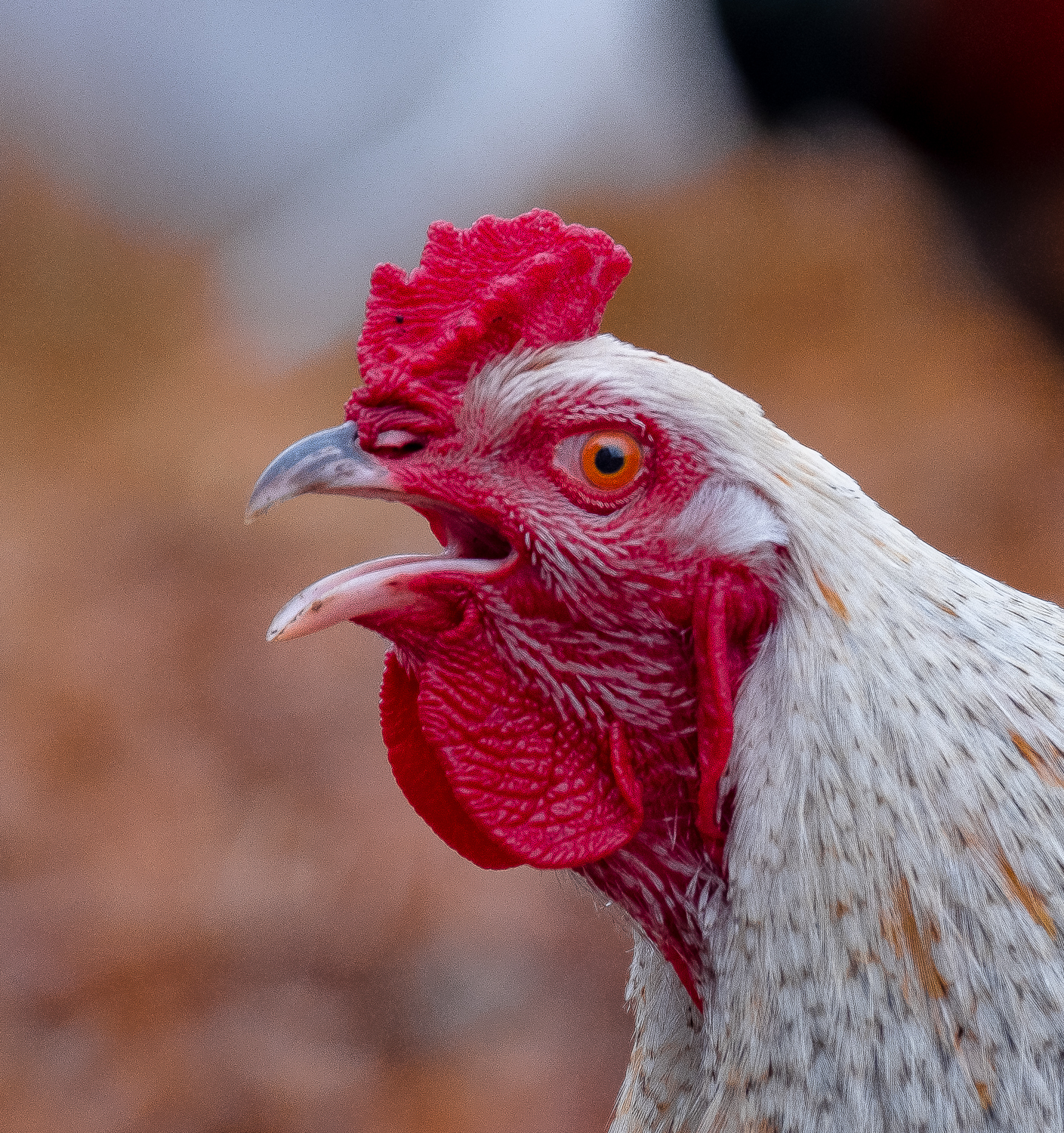

I think of chickens as tiny dinosaurs, feathered lizard creatures, gorgeous sociopaths calculating your every move mathematically. They really are something else. The cows and hogs are not the only creatures with complex hierarchy, the poultry have their own pecking order, definitely. I've grown quite fond of the 12-or-so-strong rooster flock that greets me each morning as I drive up on the 4-wheeler to do chores. As I crest the hill I see them running, so focused in their approach and earnest in their enthusiasm. The flock of gentlemen I call them, or "ROOOOOOSTERS!" I shout with glee. They have been sequestered to roosterland because my laying flock only needs one good fellow. These boys await a different destiny, unfortunately. The flock is pretty endearing anyhow, like a college fraternity at all boys school, they entertain themselves just fine and get along swimmingly.

I was born in Hungary in 1947
and stayed there for the next 25 years.
I managed to get my first camera,
kind of Russian version of Kodak box at age ten
and ever since taking pictures.
Sailing to the west in 1972 and settling
first in the Big Apple than a few years later
in Cornwall Bridge, Connecticut.
Graduating to digital at the year 2000 and never
looked back.
Currently I am mainly using Fuji X-E1
and Fuji XC-T20 cameras.
I take all kinds of pictures,
portraits including portraits of animals,
landscape and even urban photography.
You can see more on my website at:
pictures-by-lazlo.com.
My pictures received numerous national (New England Camera Club
Council, Photographic Society of America ) and international awards.
Check out my two other Ebooks on Amazon Kindle:
An Evening at the Opera
From Photographs to Paintings
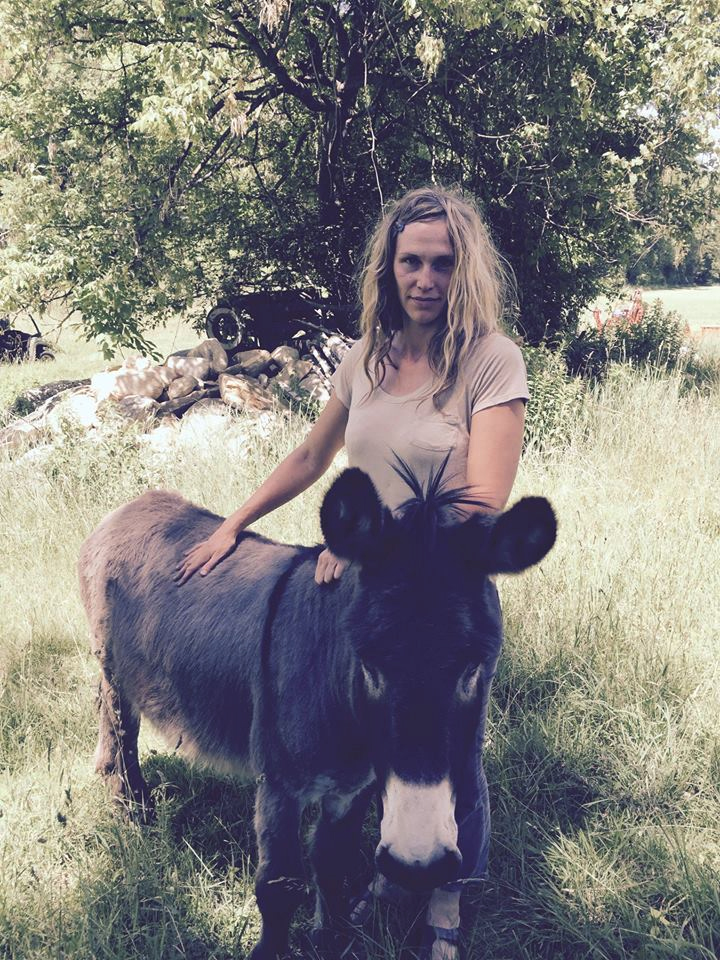
I was born in Palmer Alaska in 1985. My family and I moved to an even more remote part of Alaska in 1994, to pursue dreams of owning and operating a fly fishing lodge. This same dream took us to southern Chile in 2000 for a year where my father ran a small guiding service on the world famous fly fishing streams of Chilean Patagonia. I was always an observant kid and writing enabled me to craft my world into an understandable place where the bad could be omitted and the good could be magnified! I learned that writing was my sanctuary in an unsettled reality. I moved around quite a bit over the years continuing the gypsy spirit of my childhood only settling down in the bucolic country side of Cornwall Bridge CT in 2014. My life now, is rooted, but the adventure lives on in Daniel and I's dreams of a life of farming that bring joy to our souls, comfort and happiness to the lives of our critters and healthful and sustainable food to our community, that's the plan anyhow.